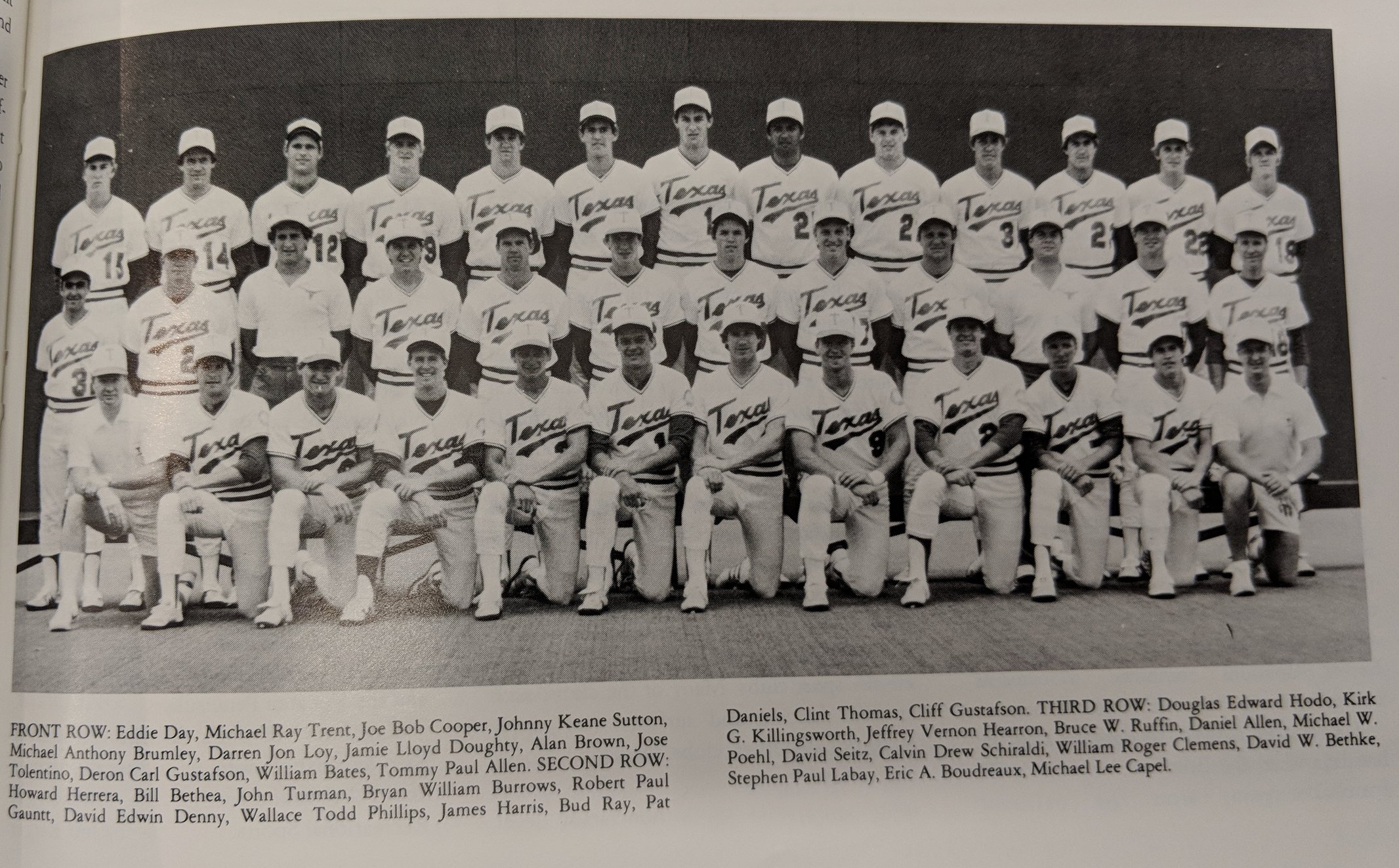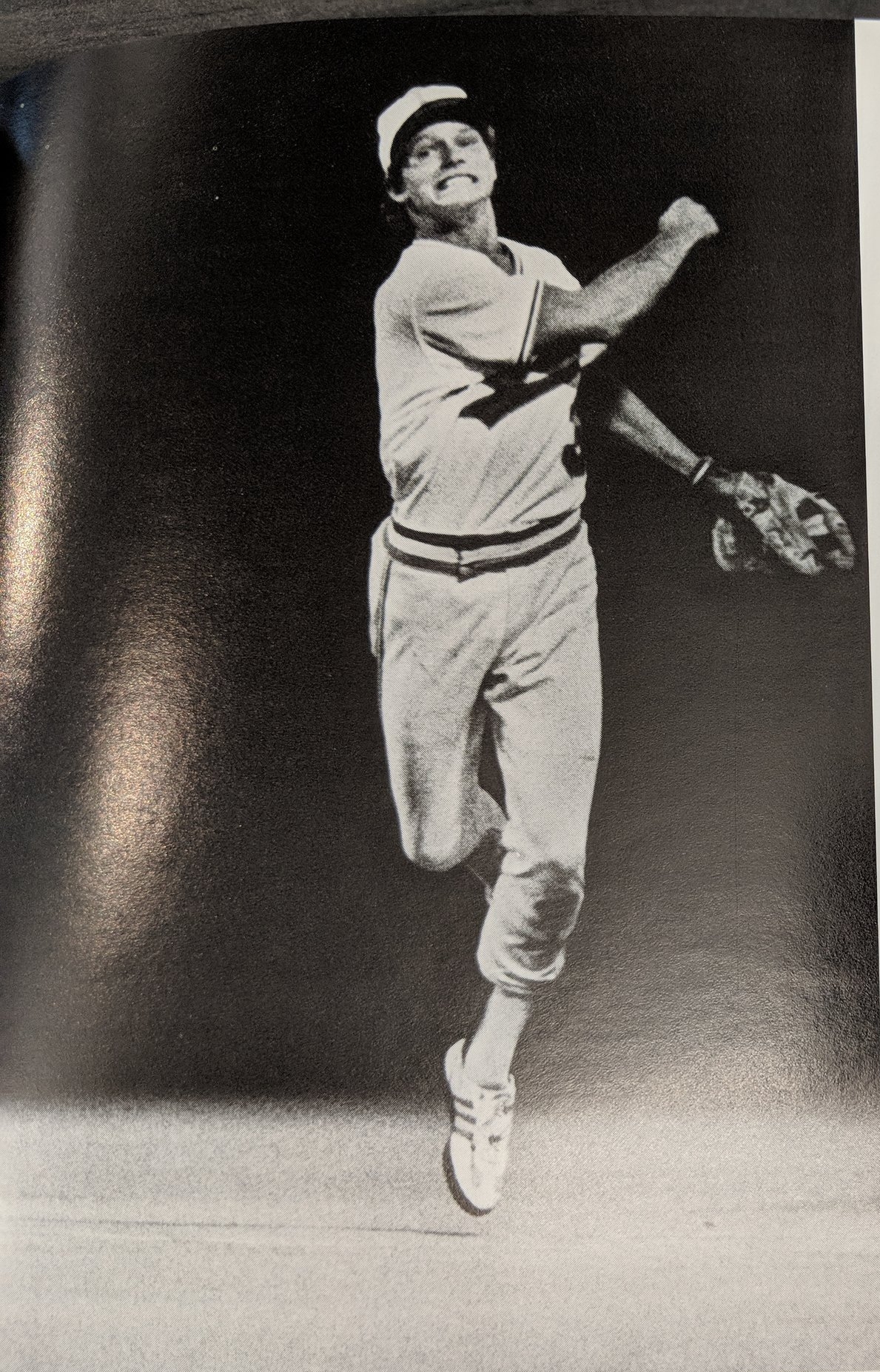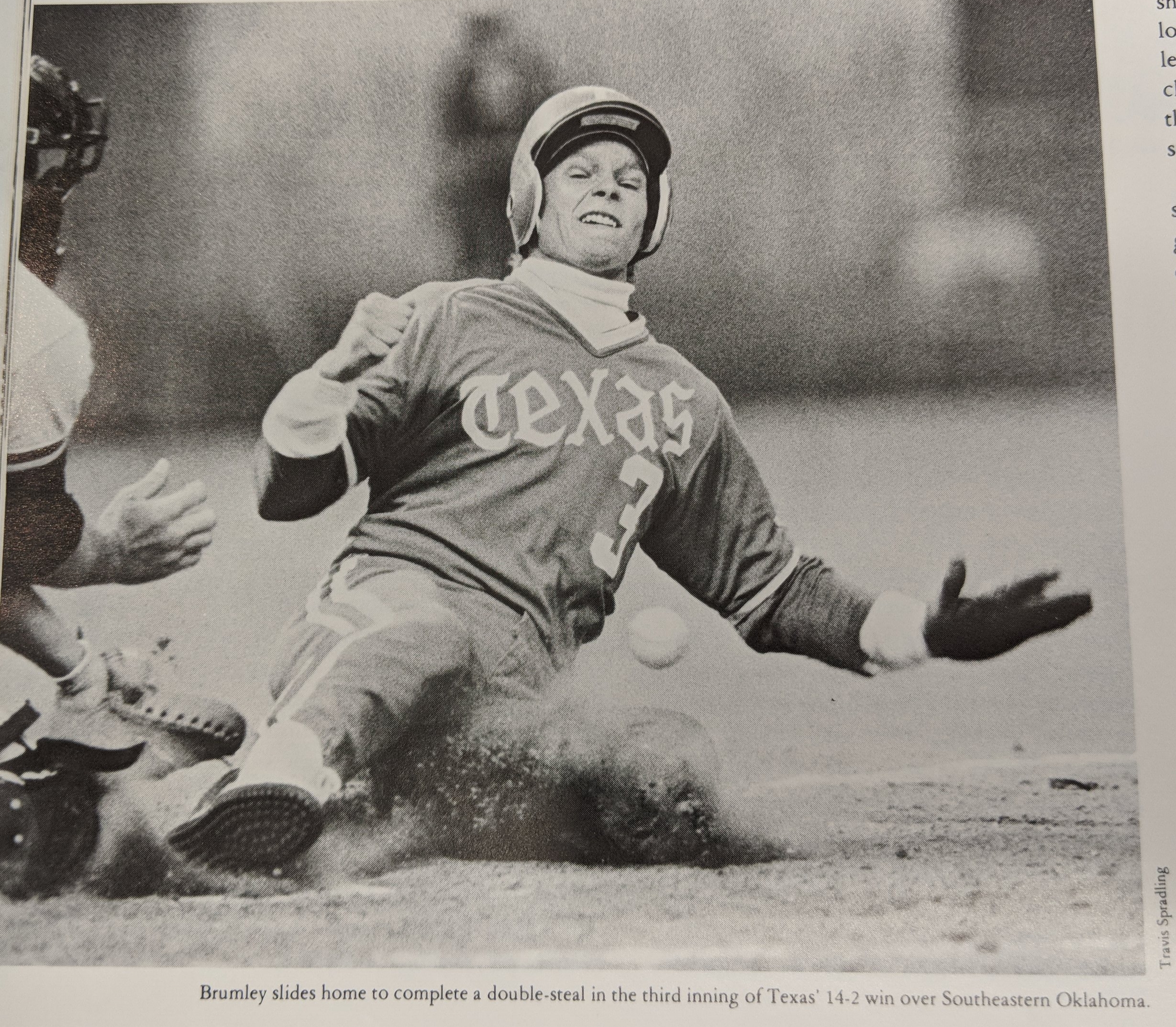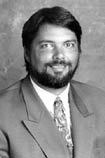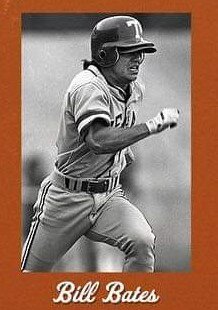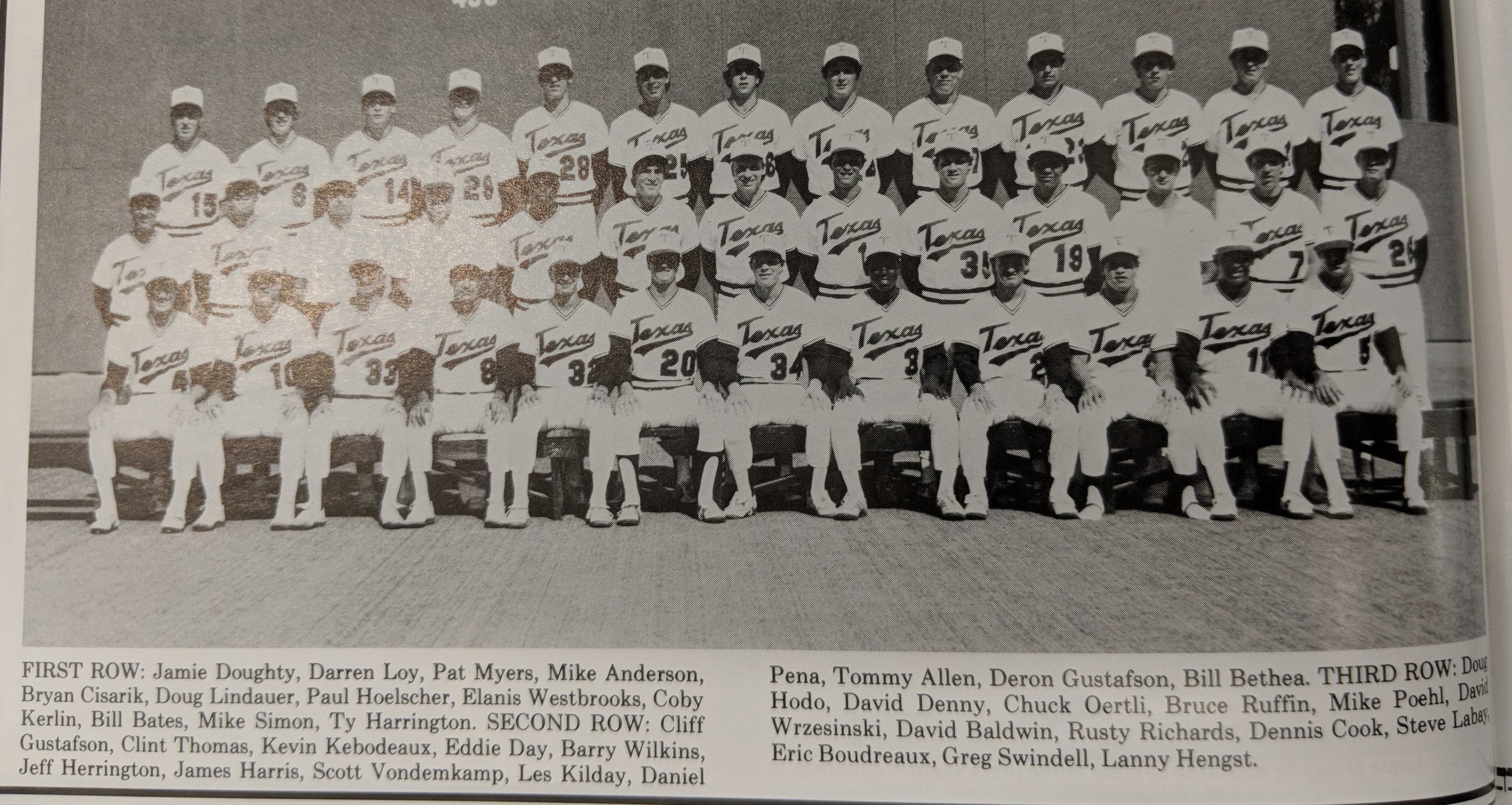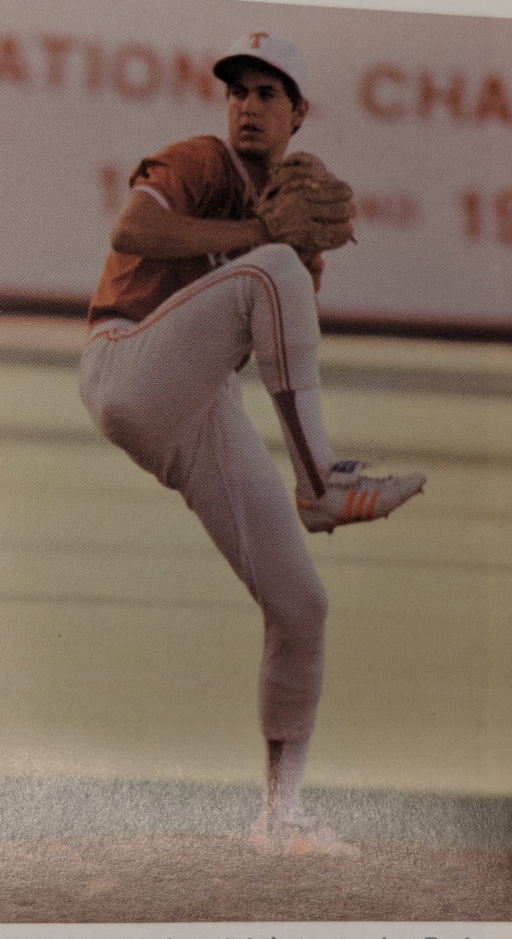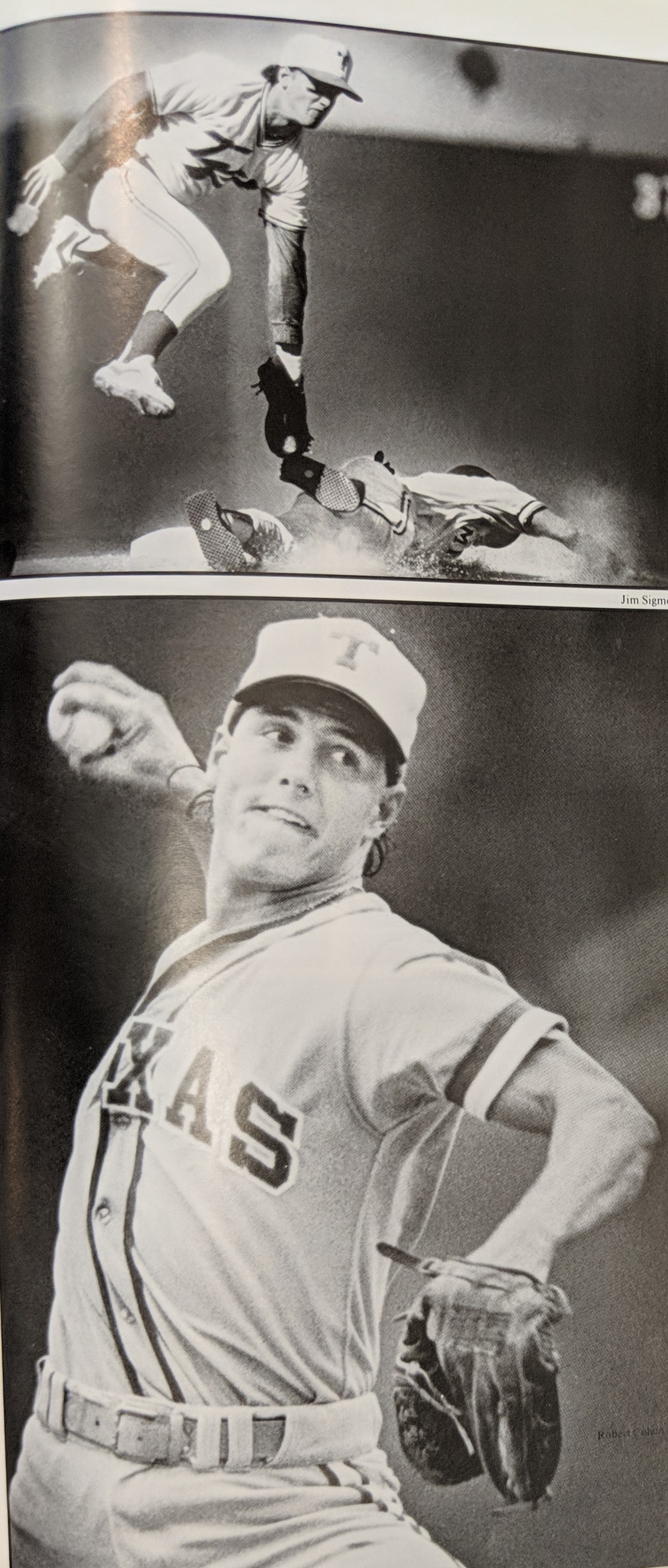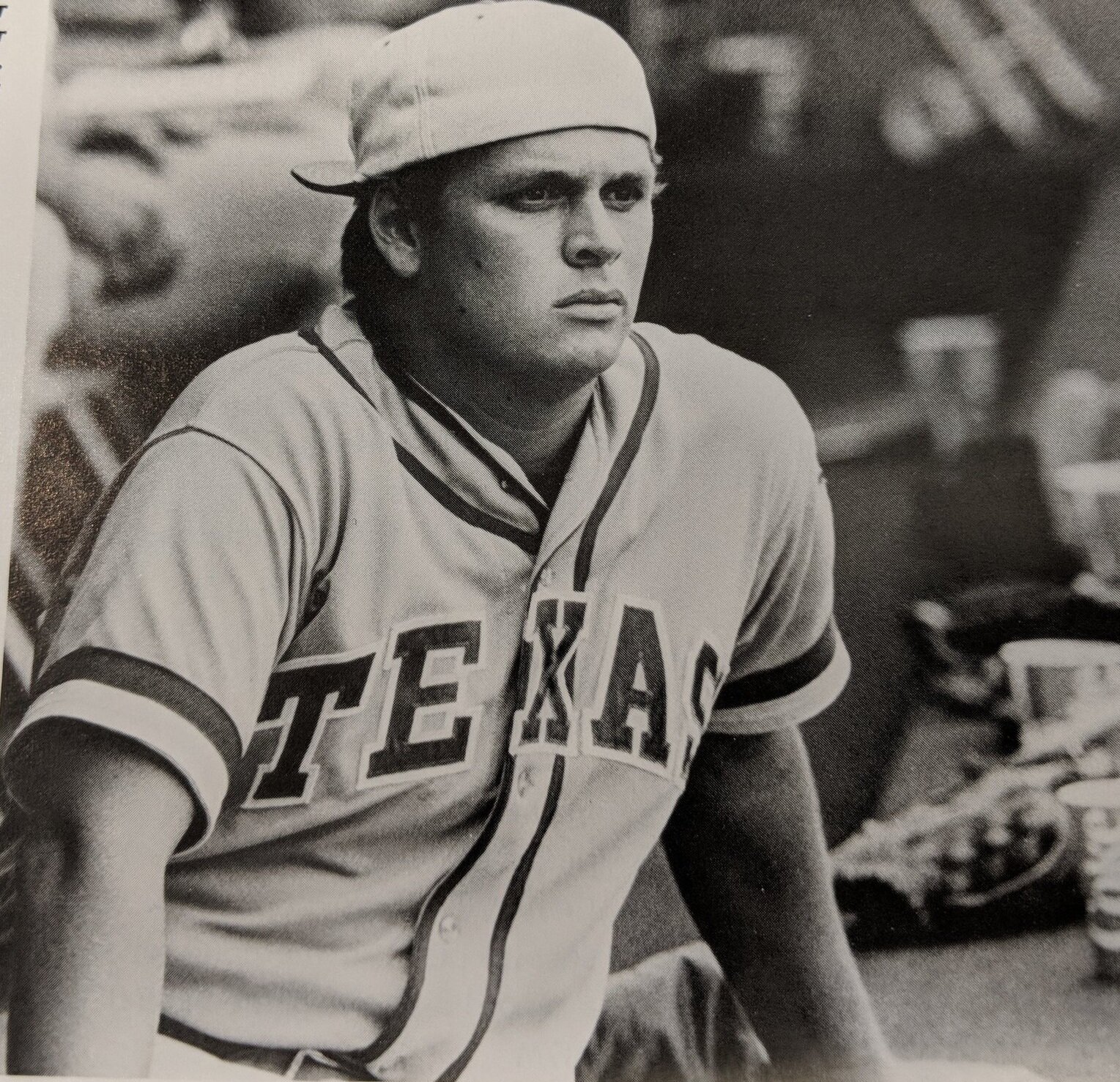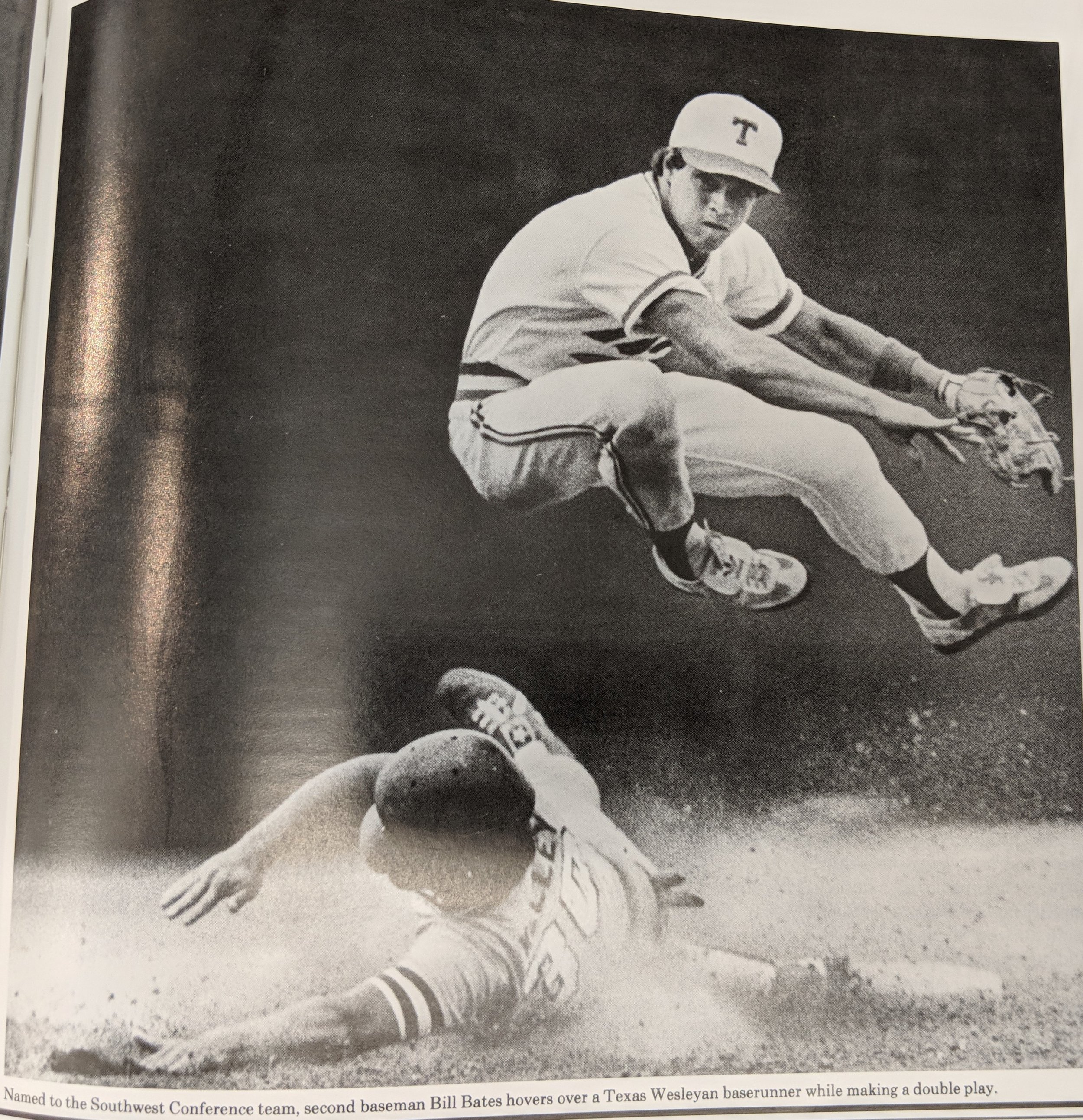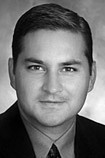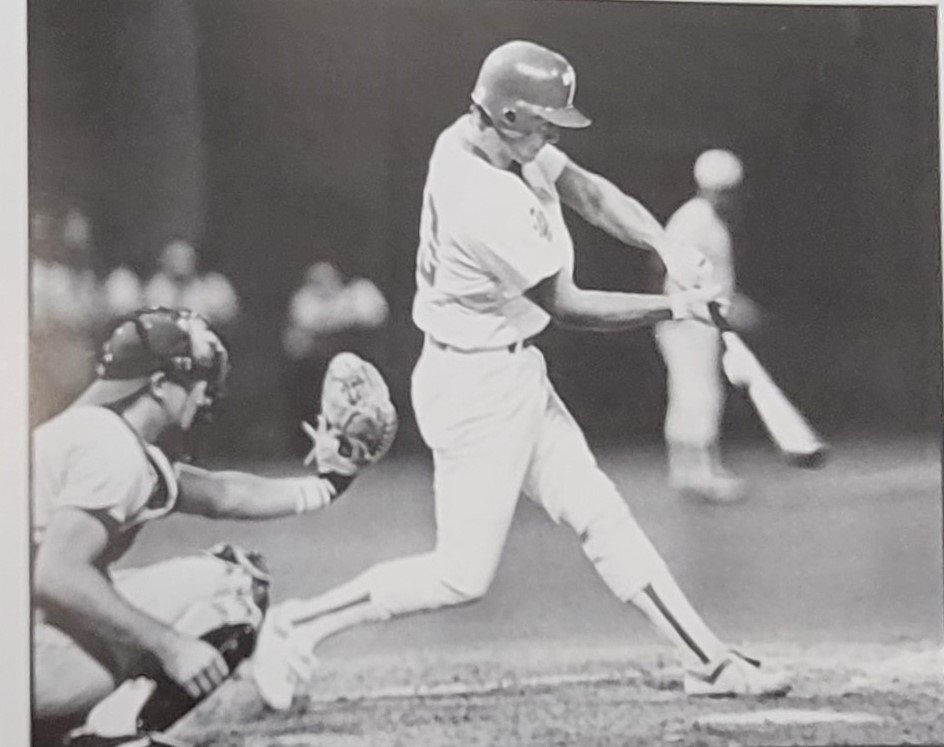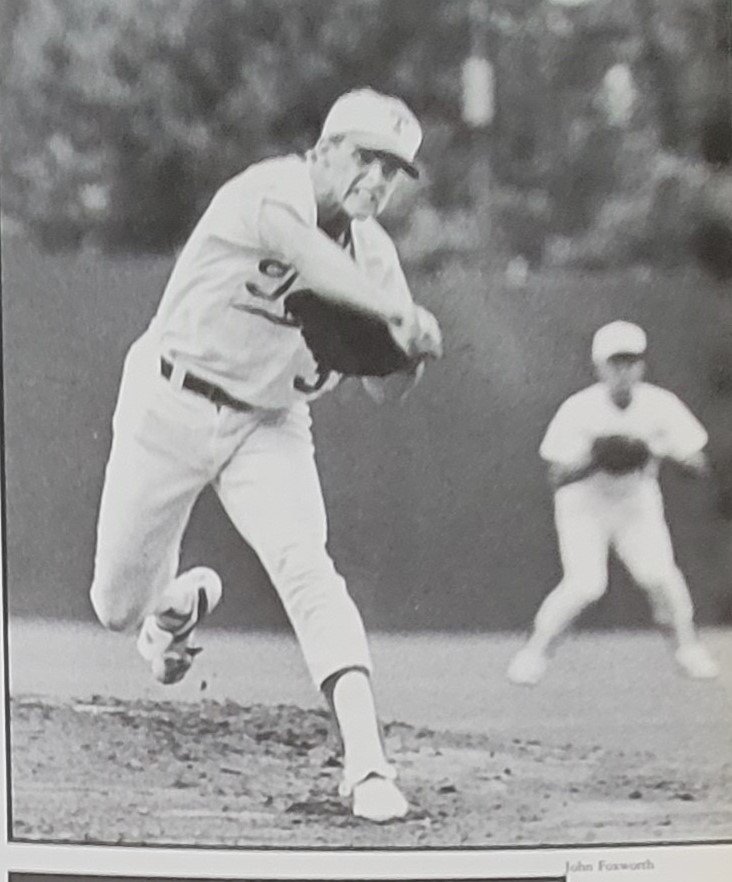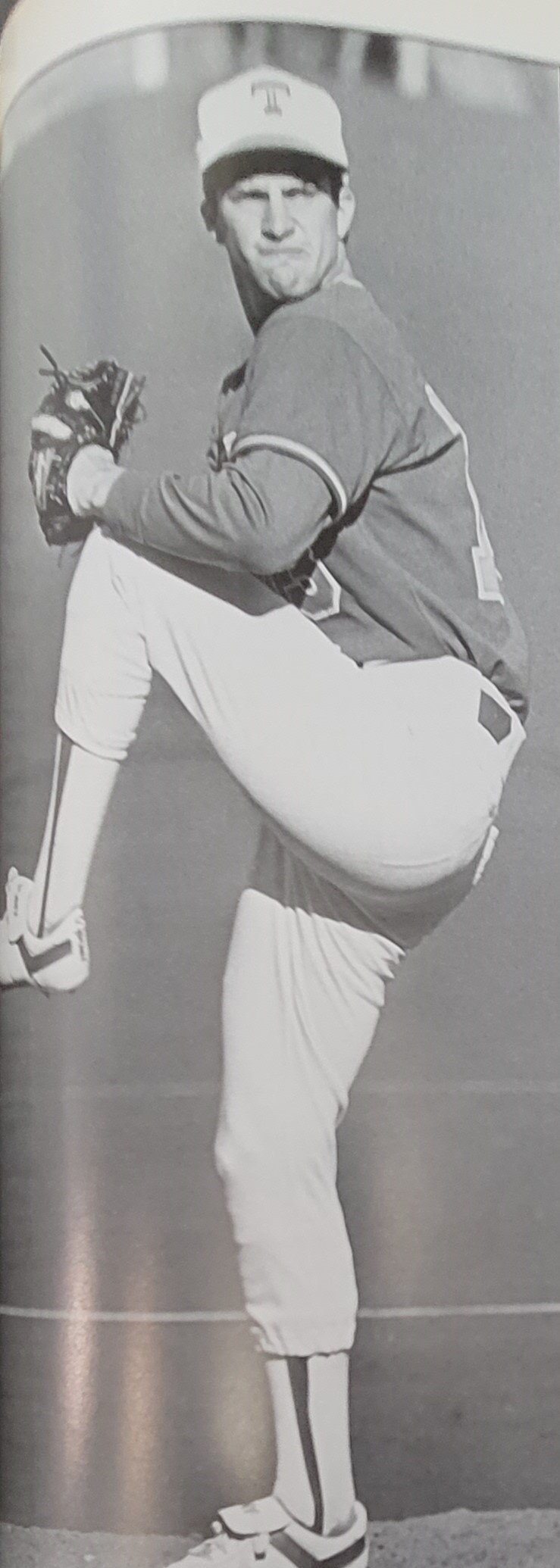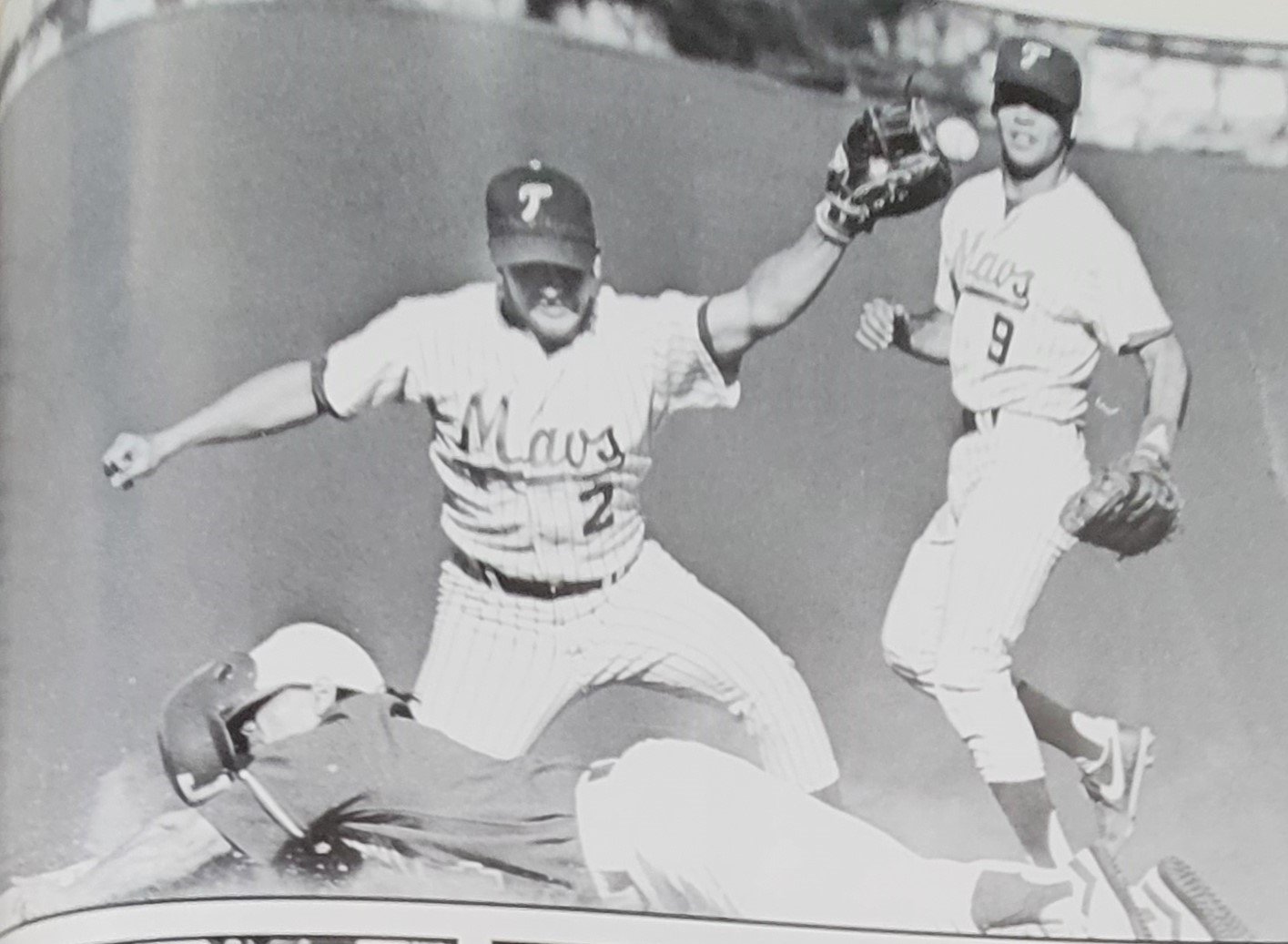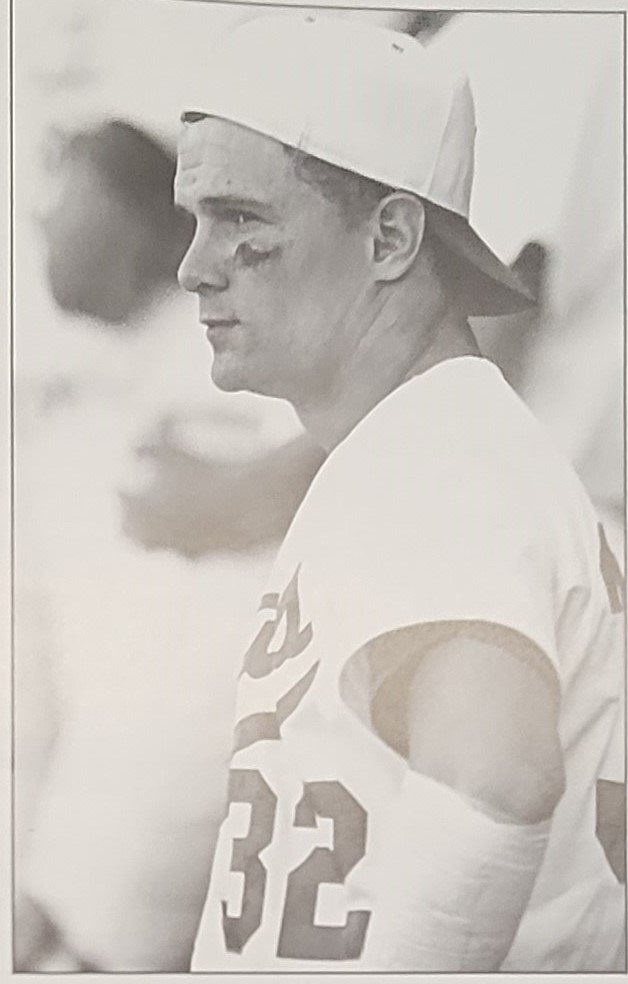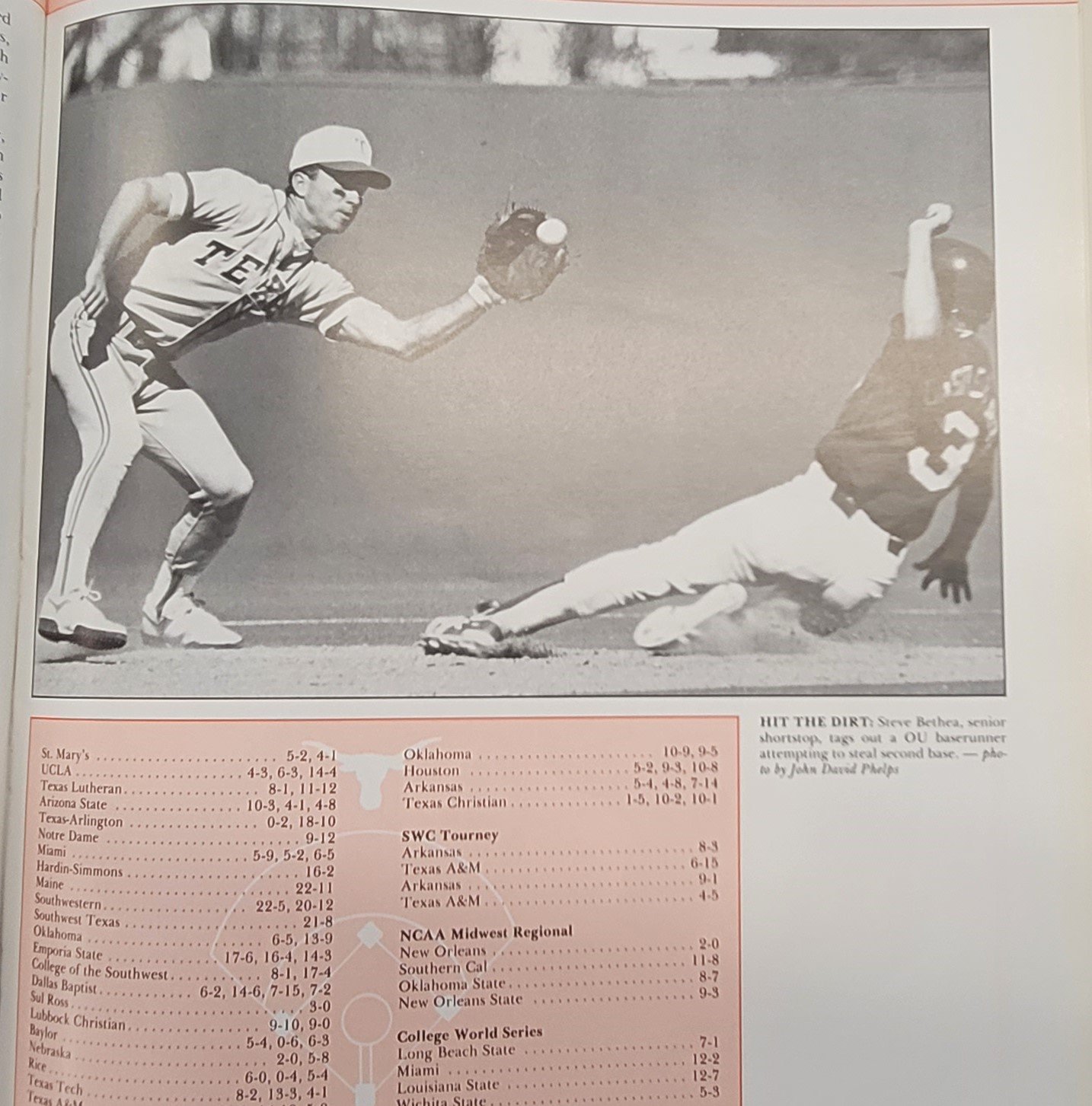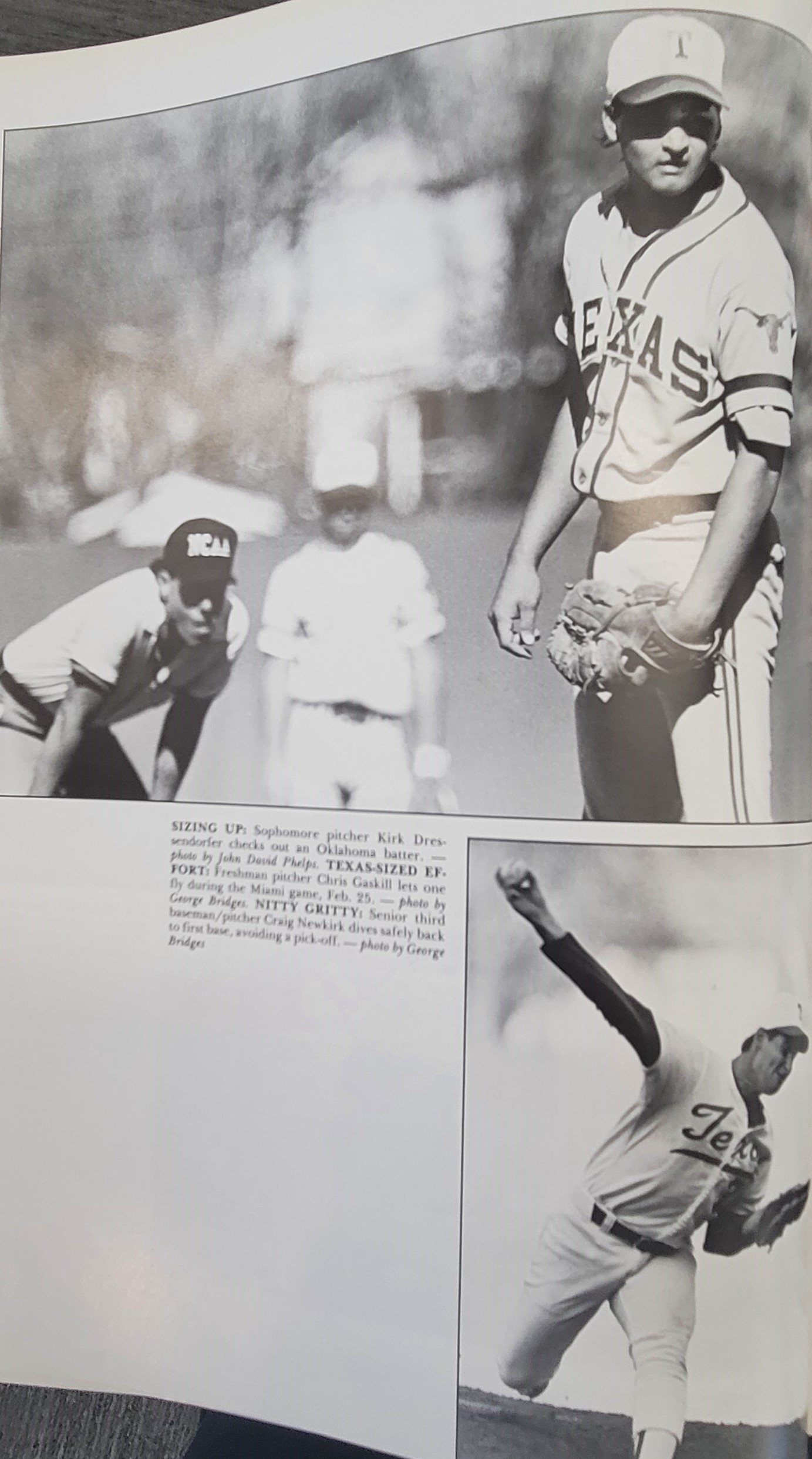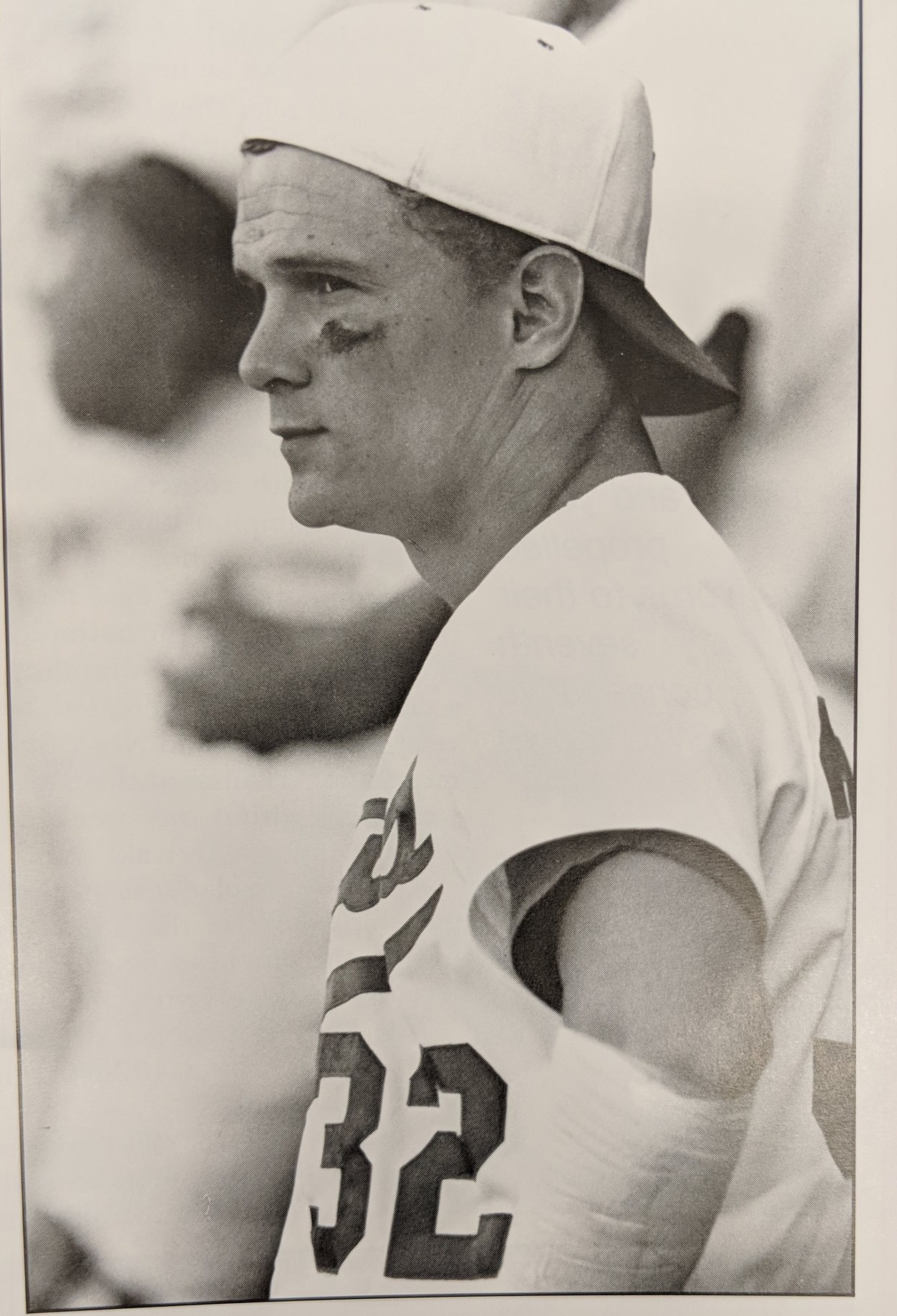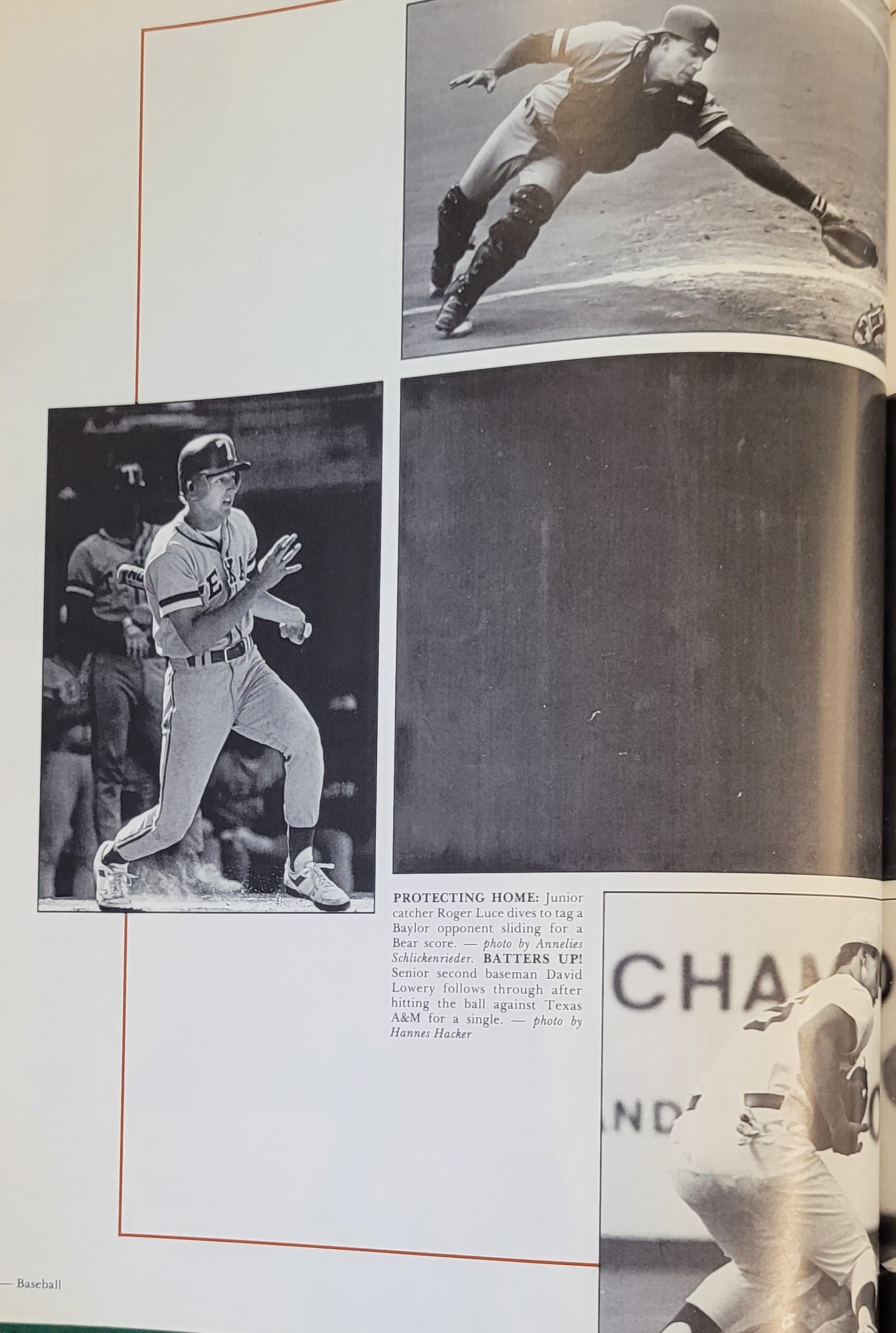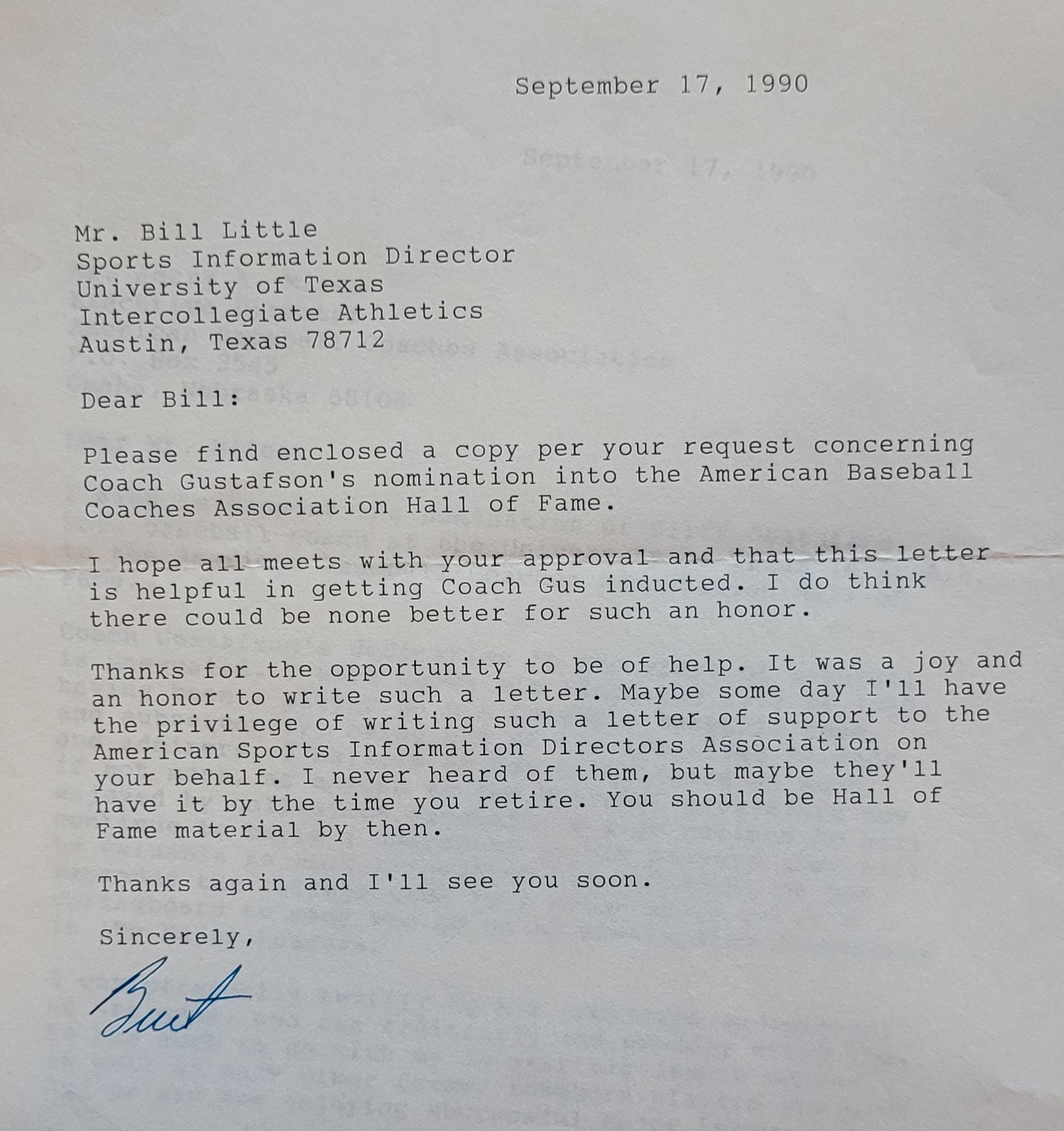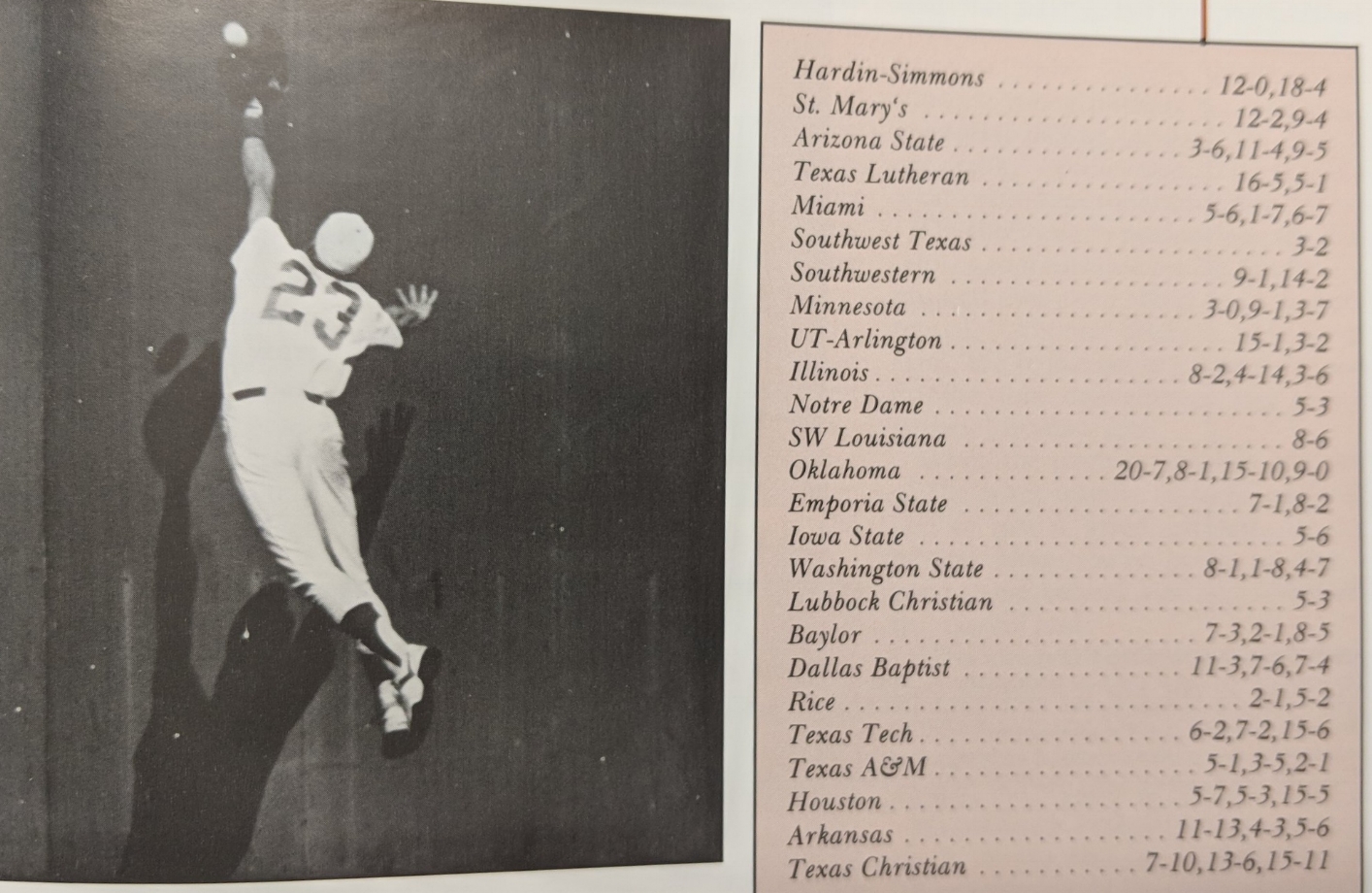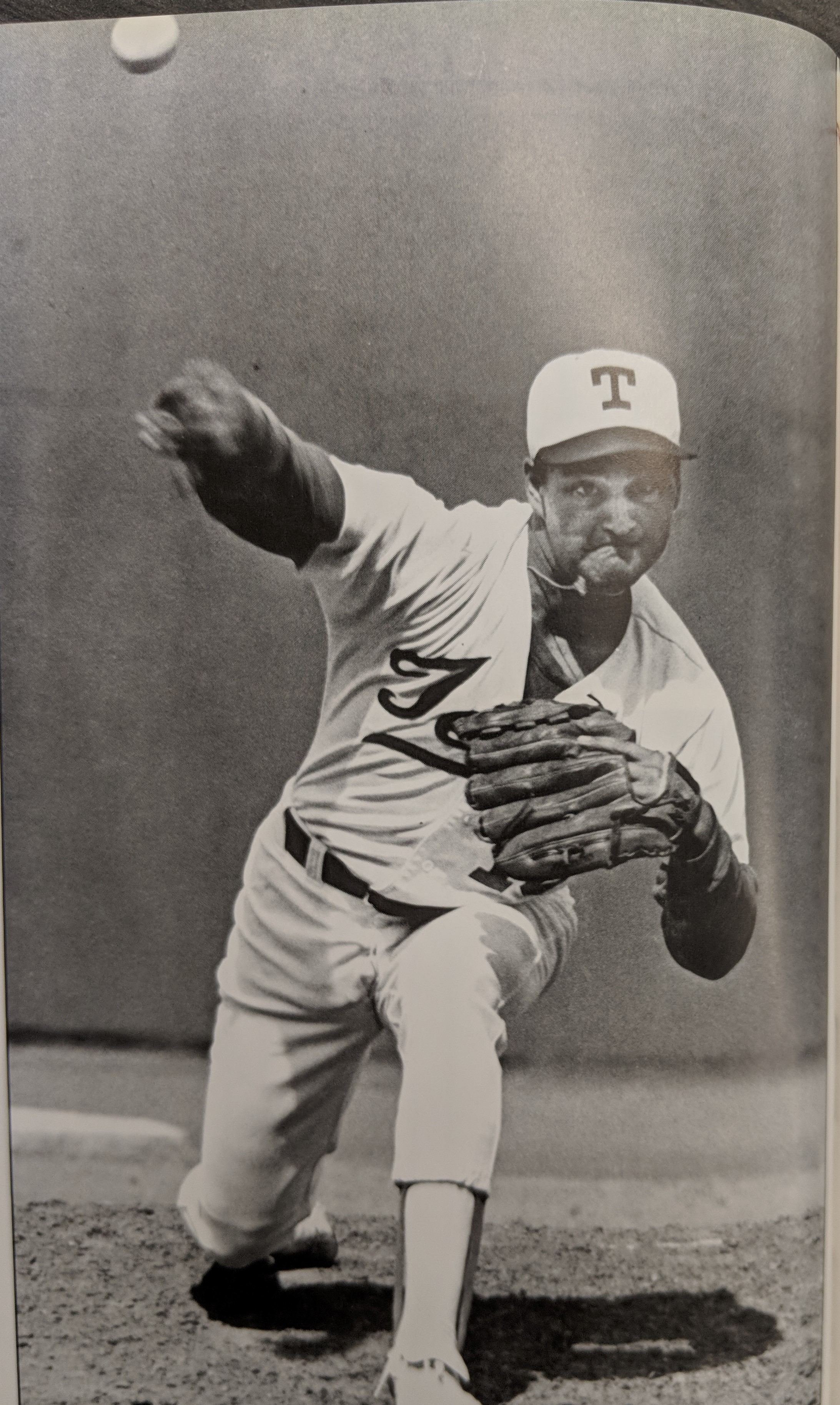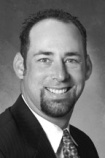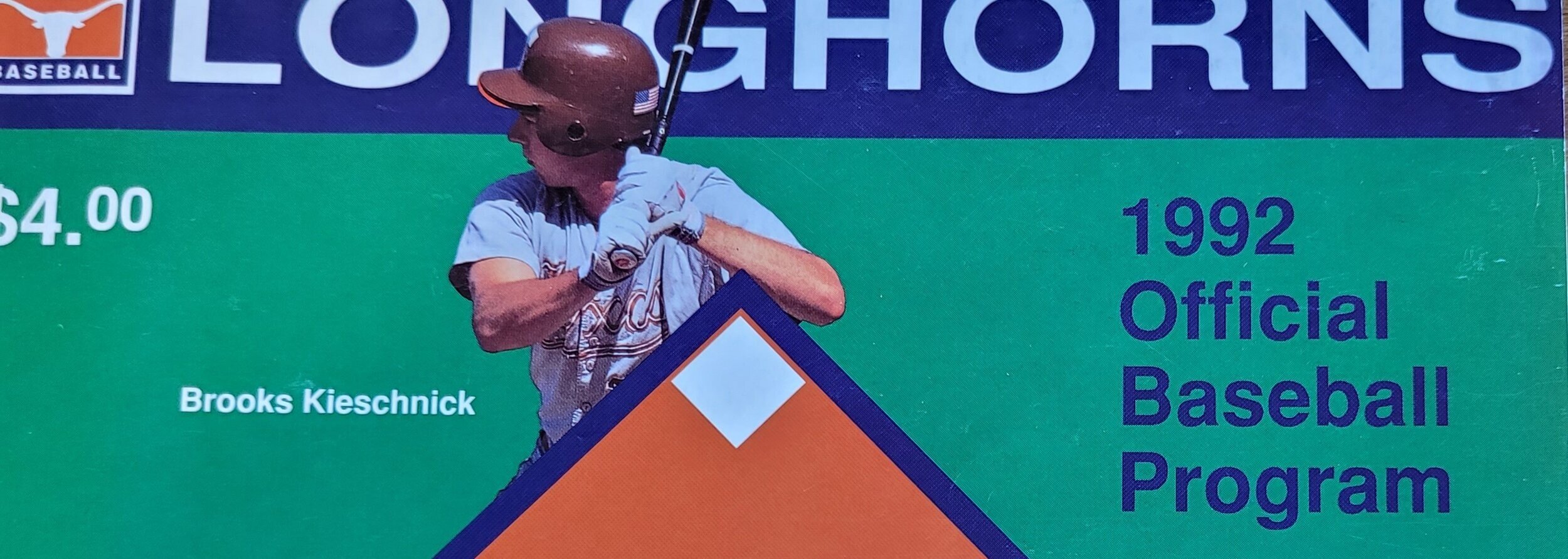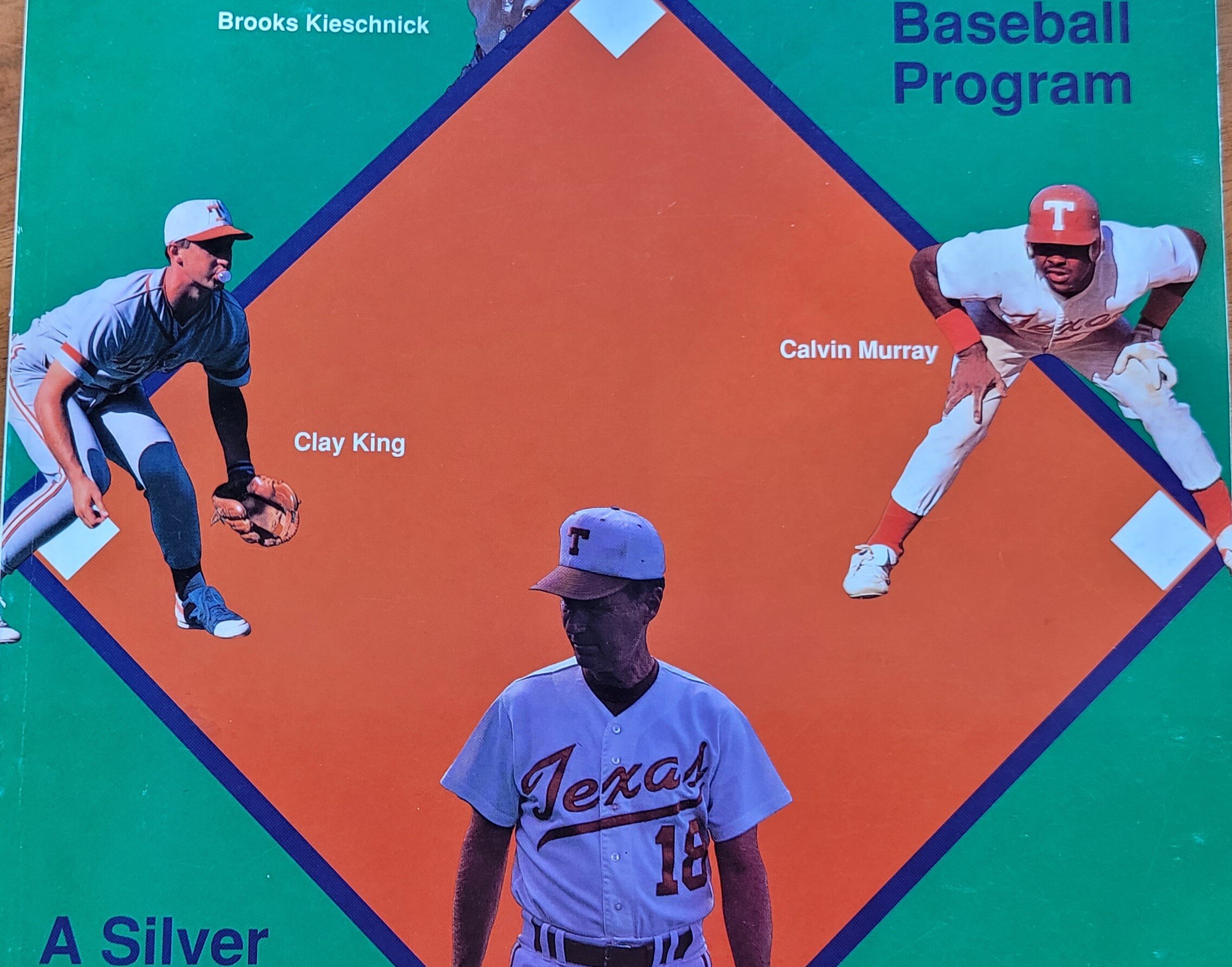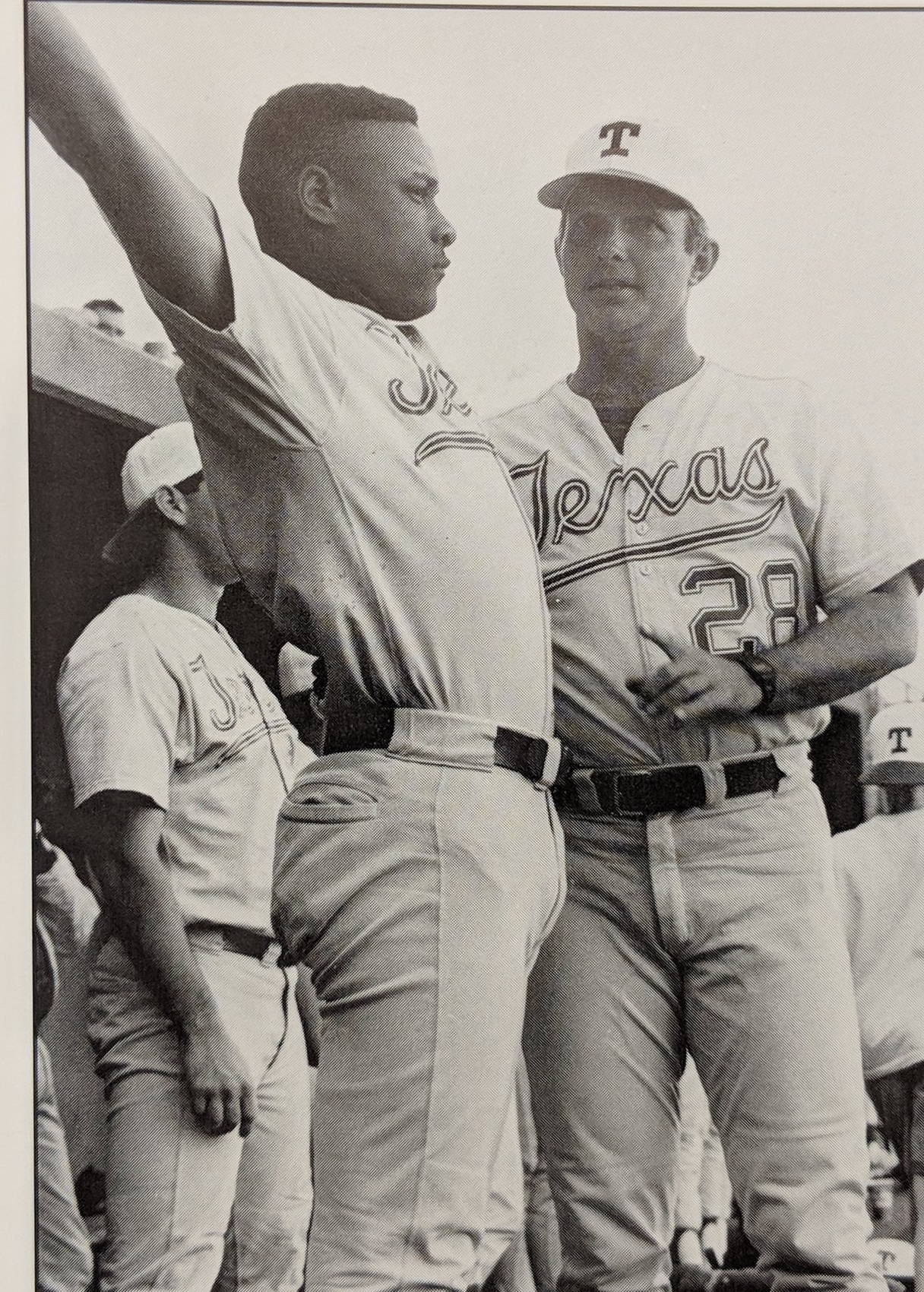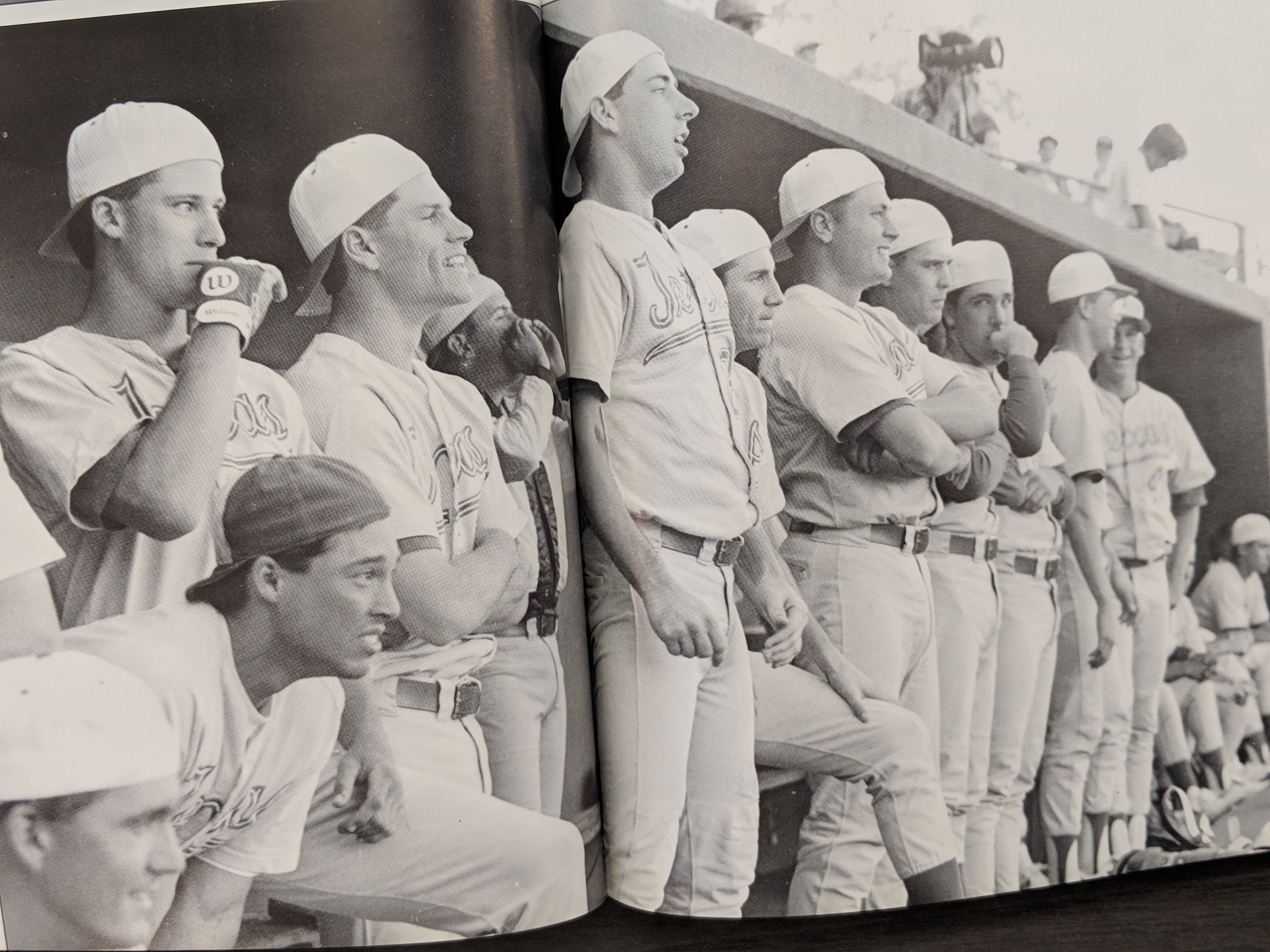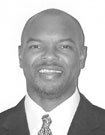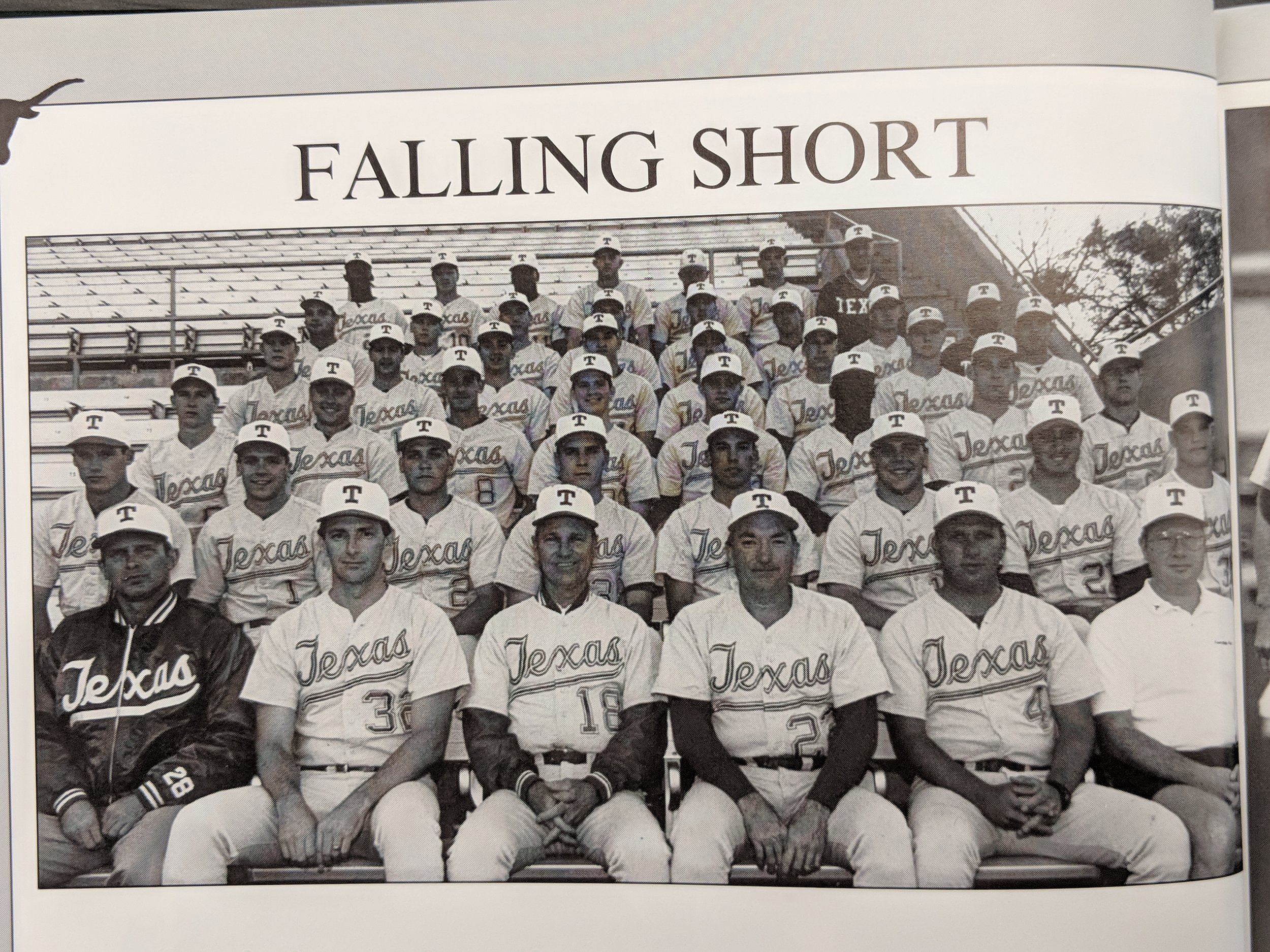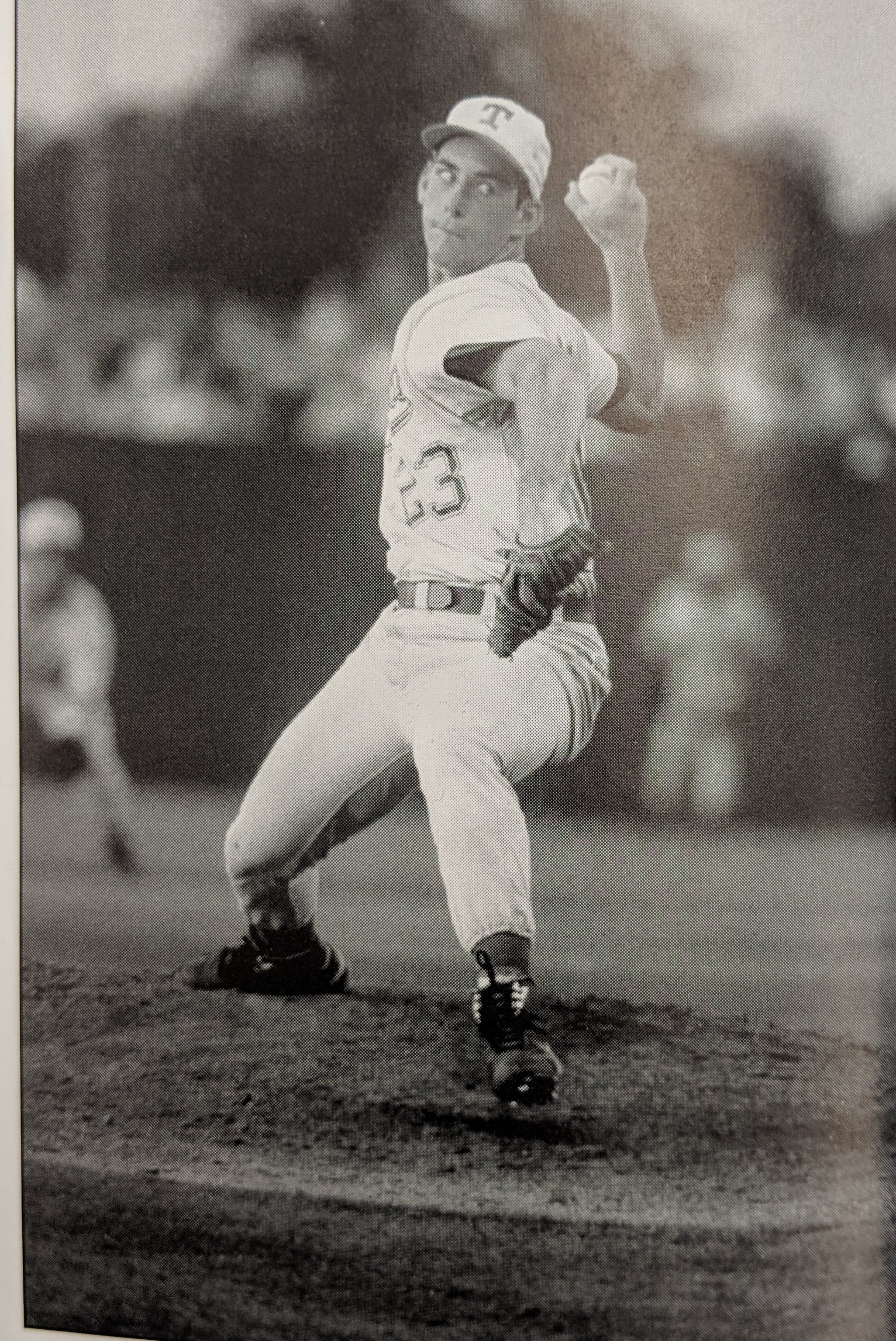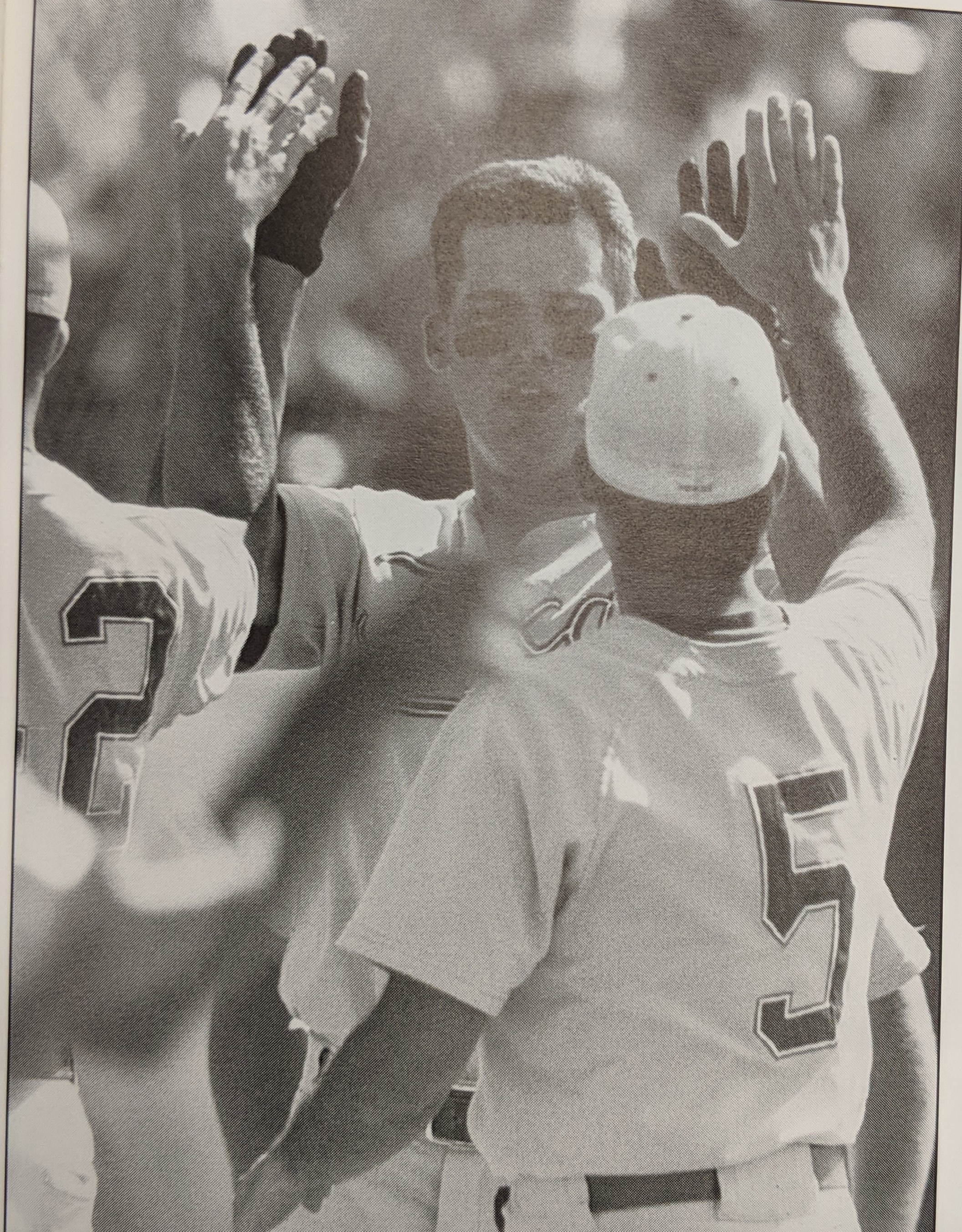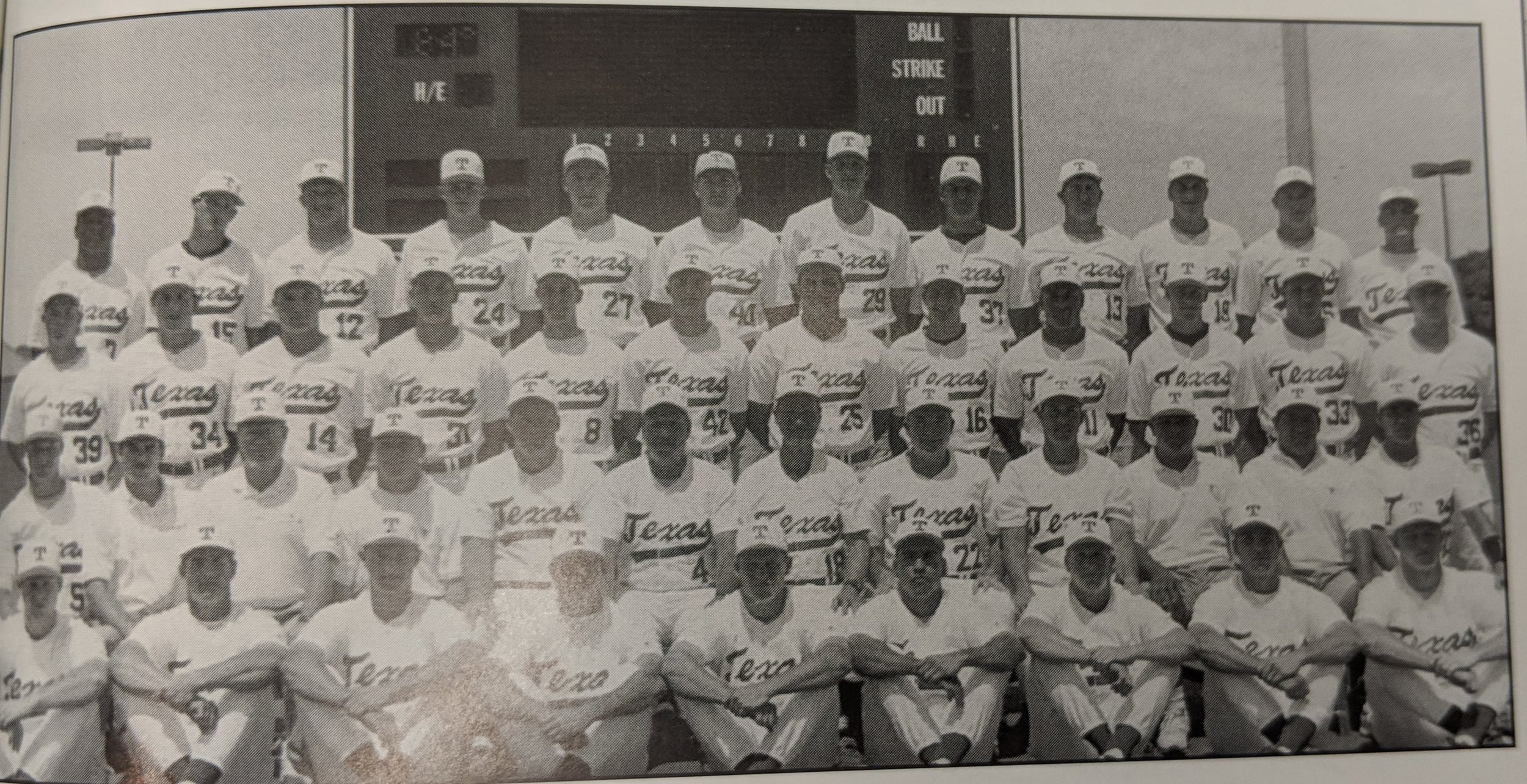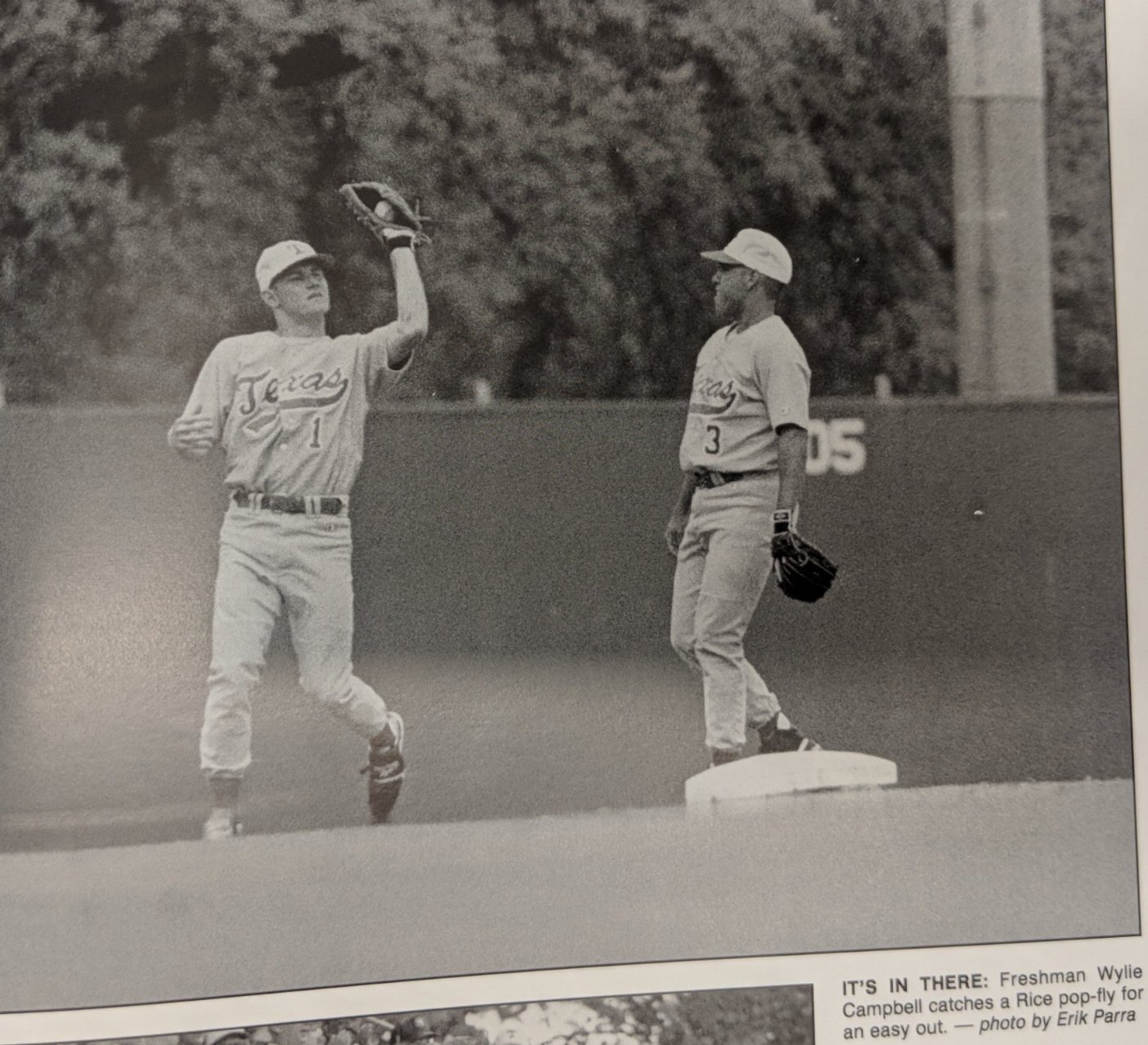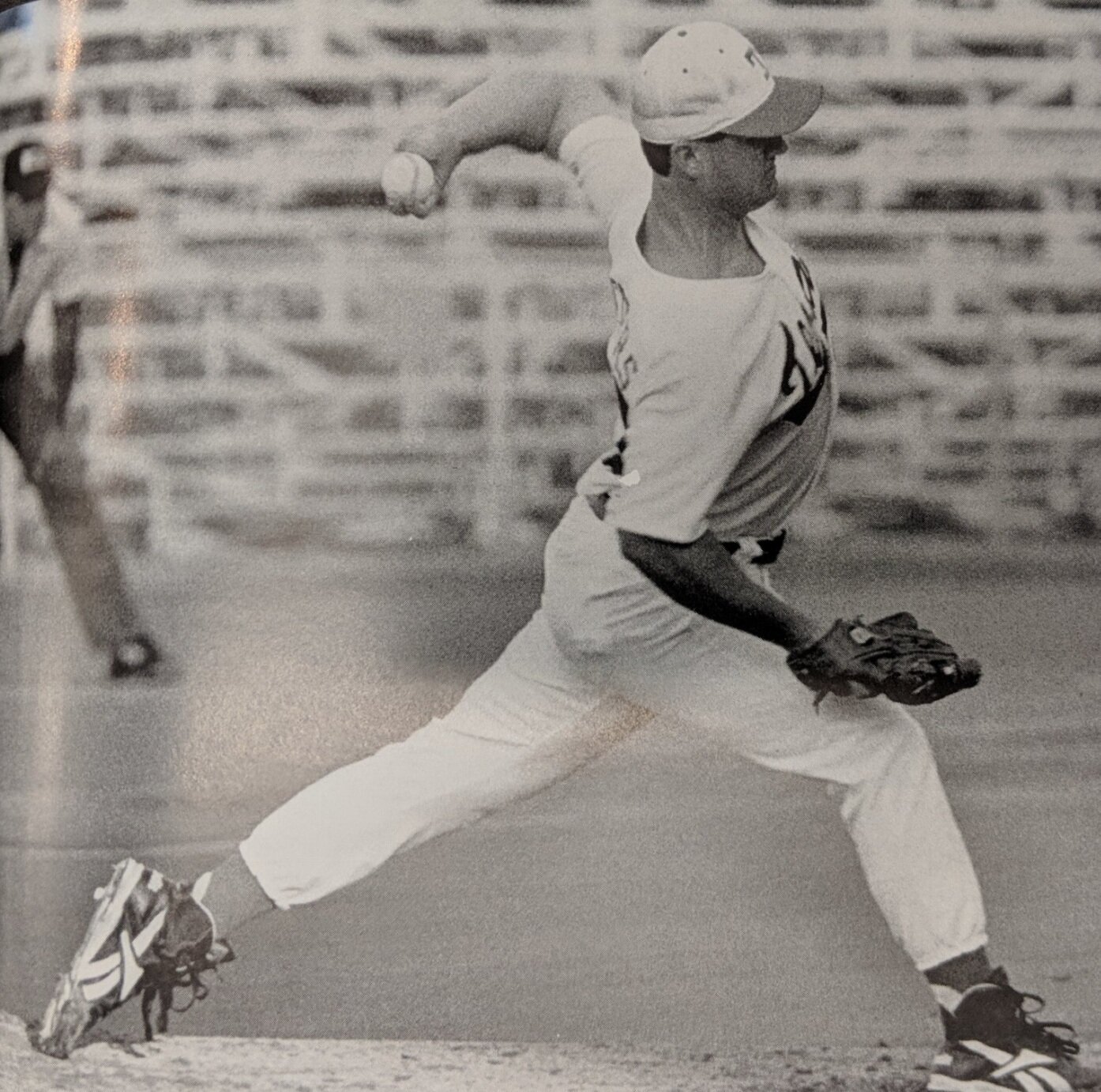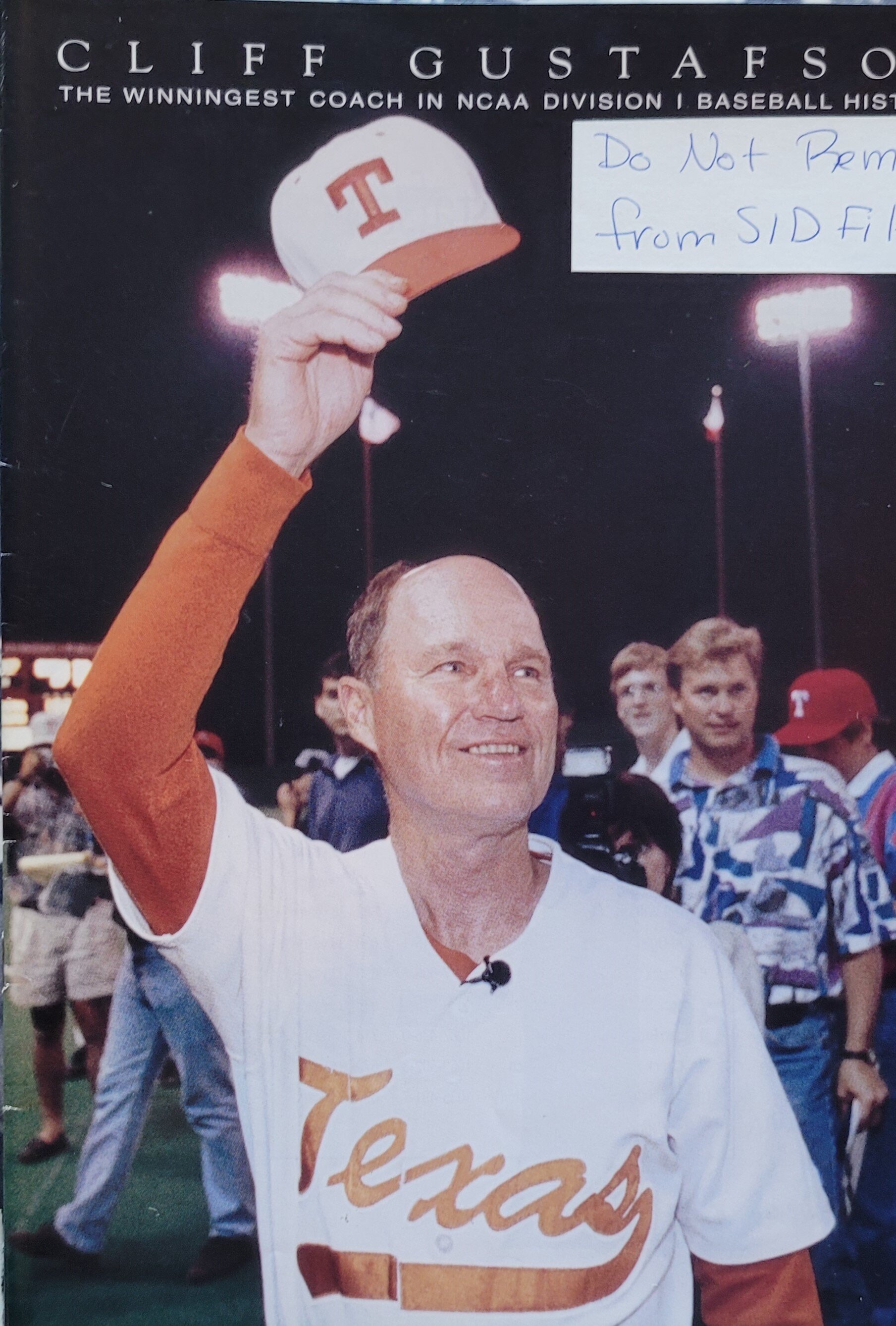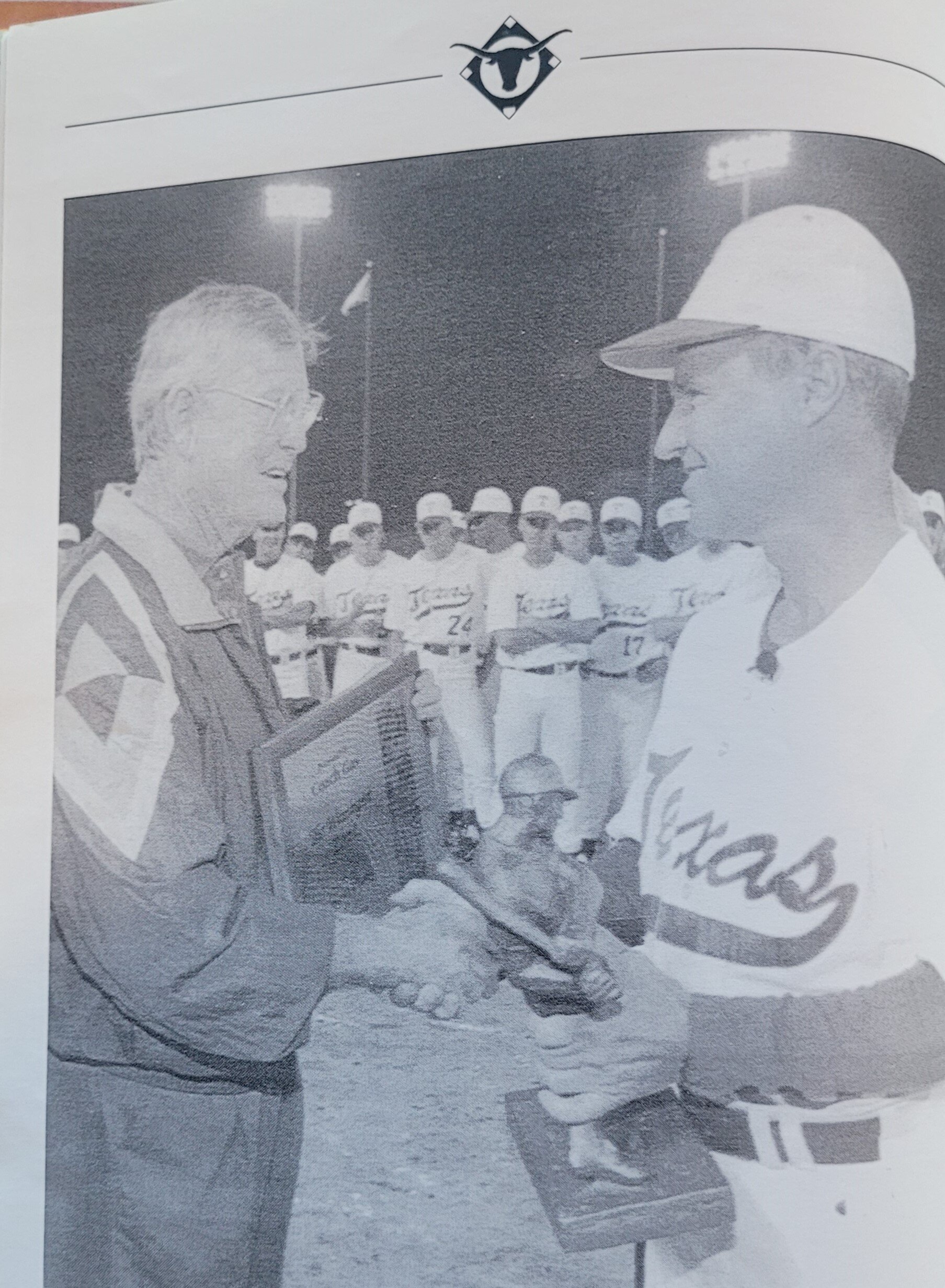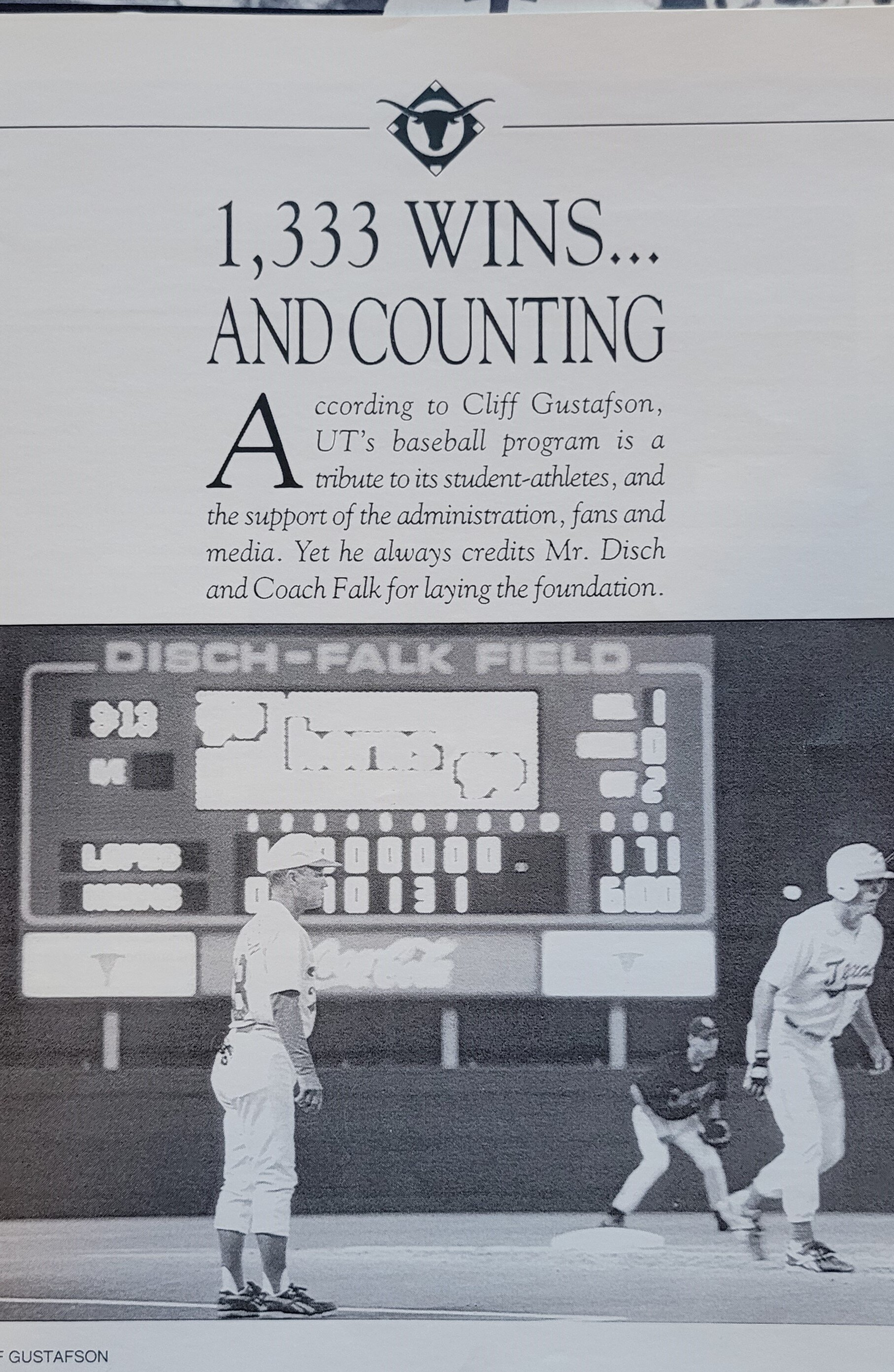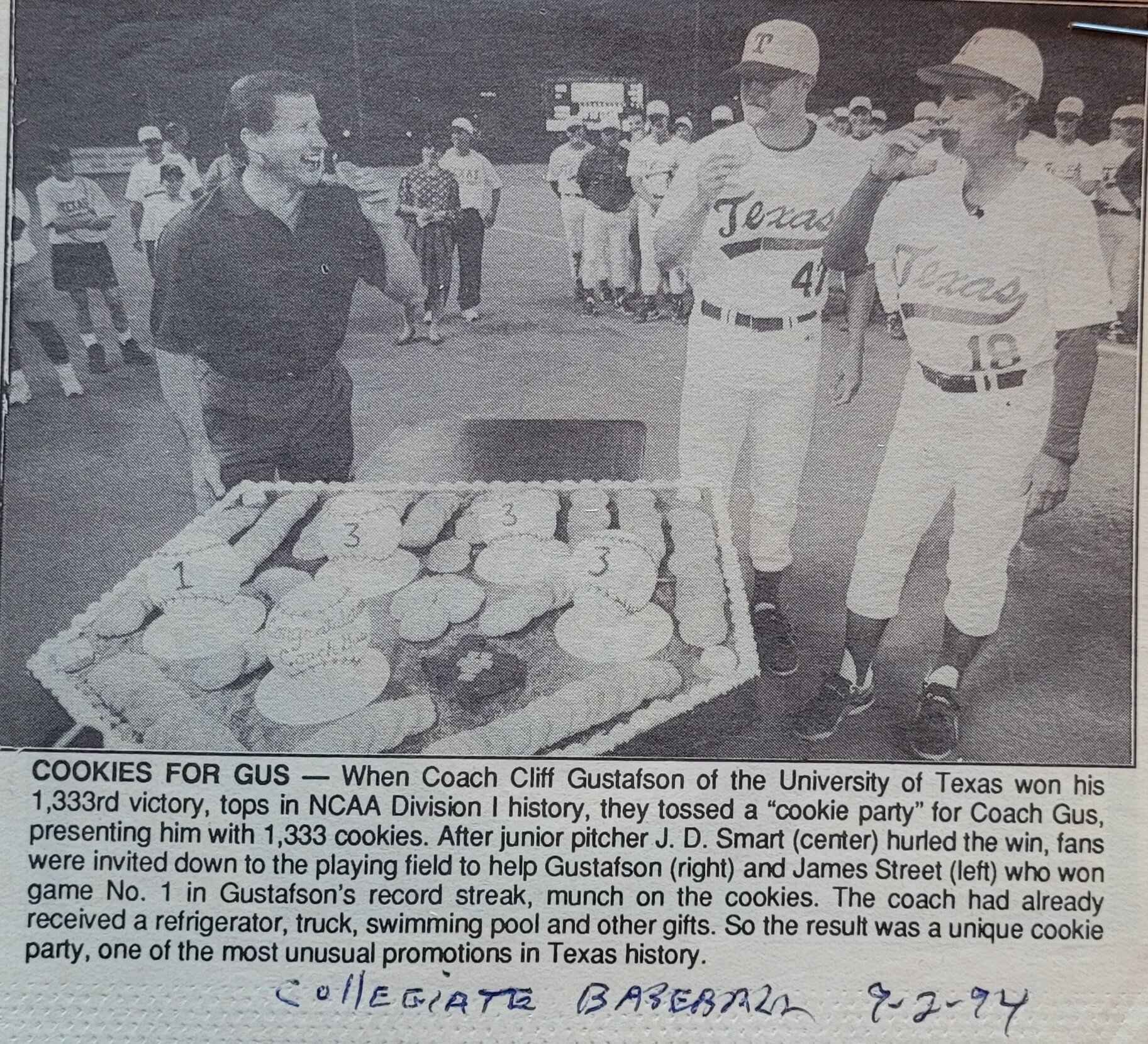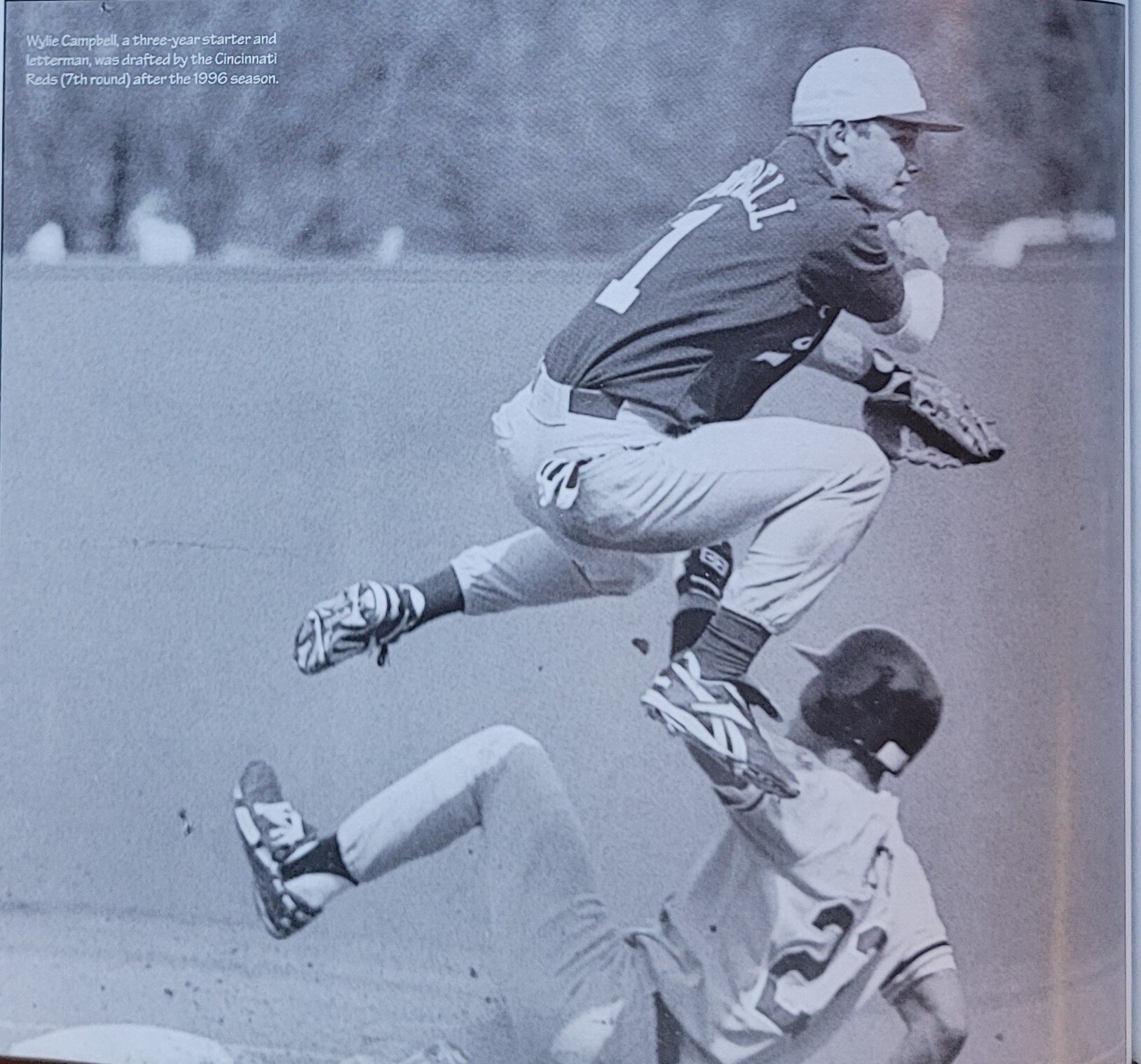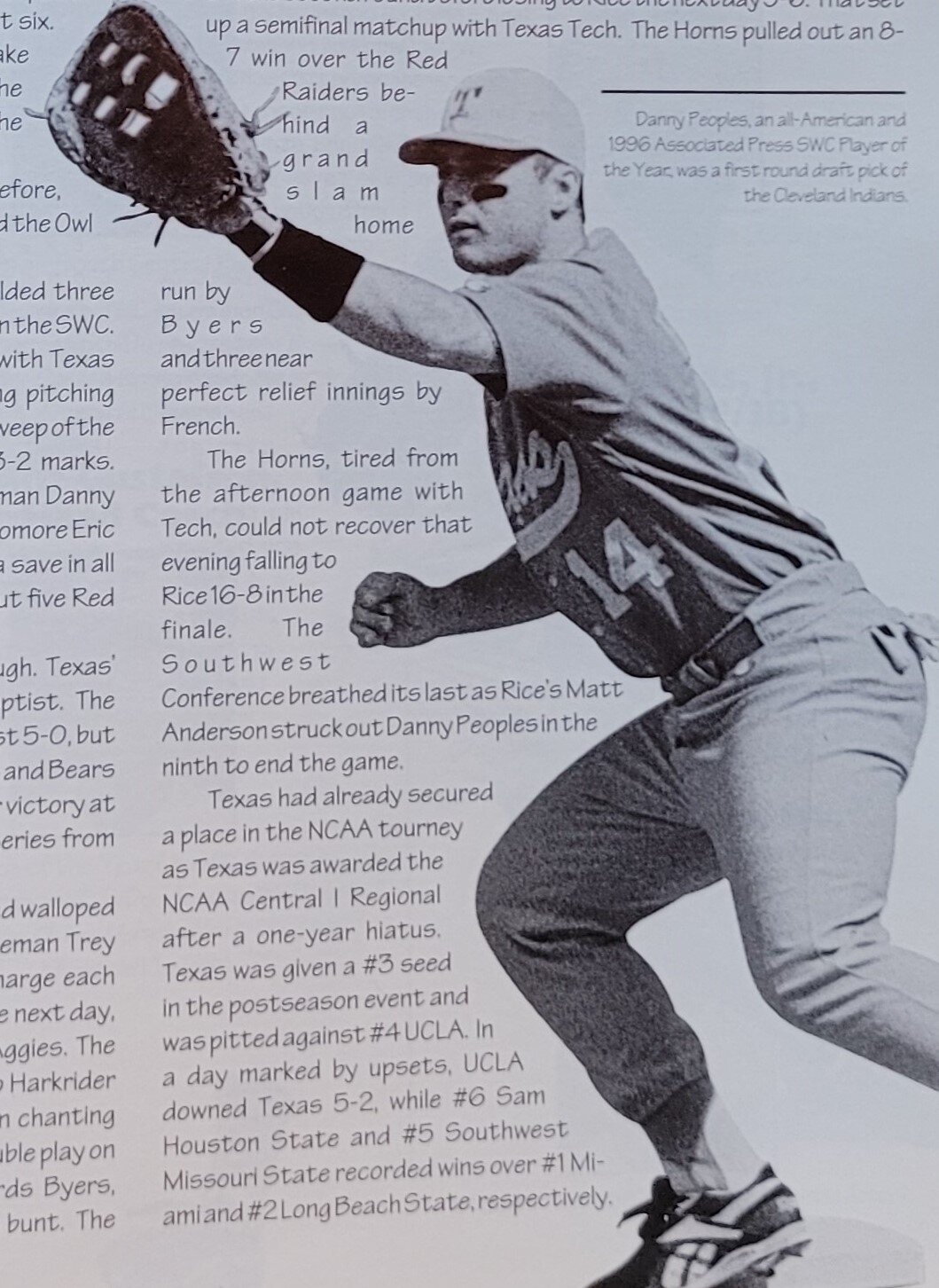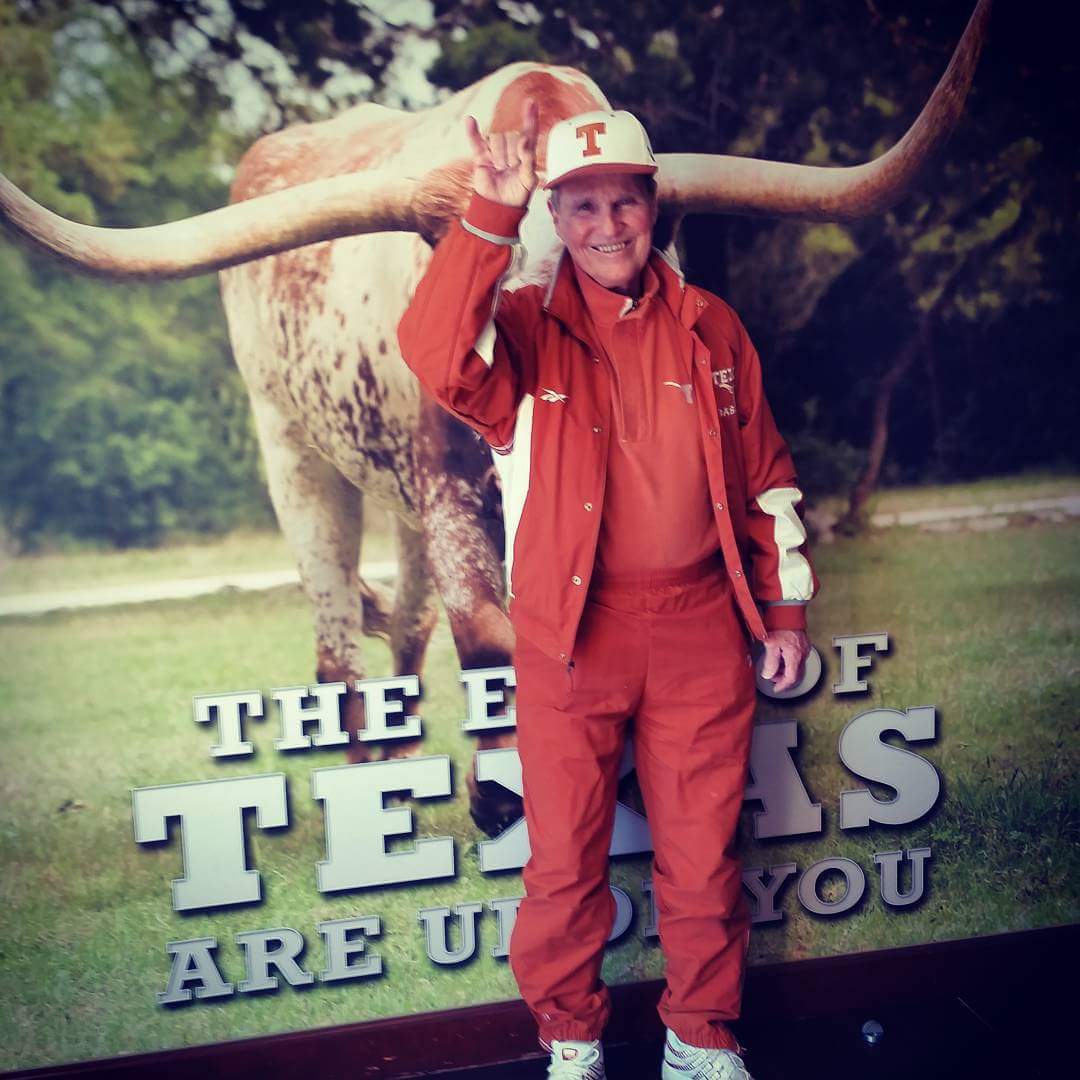1983- 66-14 National champs Gus Ball at it’s finest
The NCAA tournament field was expanding, and some six-team regionals were staged. Texas had a great pitching staff, including eight players who would pitch in the major leagues, including Roger Clemens and Calvin Schiraldi.
Texas fought its way out of the losers bracket, and beat the Bulldogs in the championship game, 12-3, behind the pitching of Clemens and Schiraldi, just a few years later these two would combine to pitch the Boston Red Sox to professional baseball's World Series.
The 1983 team had great pitching but was not overpowering in other parts of the game. During the season, the Horns lost to St. Mary’s Texas Wesleyan and Texas Lutheran. But as the season progressed, unexpected individuals helped the team move forward. John Sutton, a little-noticed outfielder, was the MVP of the regional tournament, and Steve Labay came out of the right field to save a regional victory. With only 2 home runs in 78 games, Mike Brumley hits a bases-loaded home run to win a CWS game. Gus Ball worked its magic. Texas won with one of the poorest CWS statistical records. Just barely winning most of the games.
11.06.2006 | Texas Athletics
National Championship moments: 1983 Baseball from TEXASSPORTS.COM
In Regionals, The club faced elimination after two games but bounced back to beat Tulane, Pan American, and Mississippi State twice to advance to Omaha. It was not any easier at the CWS double-elimination tournament. Texas had to come from behind to win in four of its five College World Series games. Still, this was one of the most dominant runs in the history of the CWS.
The 1983 Texas team does not lose a game in Omaha and wins two extra-inning games. Texas defeated James Madison in the opener and came from behind to beat Oklahoma State, Alabama, and Michigan before scoring a 4-3 championship victory over Alabama. By winning the College World Series in five straight games, the Longhorns became the 10th team in NCAA baseball history to go through the Series unbeaten.
This team had many and varied heroes. First baseman Jose Tolentino hit .339, smashed 12 home runs, collected 100 hits, and drove in 73 runs. Designated hitter Doug Hodo hit .345 in a platoon role with Kirk Killingworth. Catcher Jeff Hearron hit .341 with six home runs and 48 RBI. Mike Brumley and Bill Bates played infield with Brumley hitting .298 with 82 runs and 56 RBI as a shortstop and Bates batting .296 with 13 doubles and 69 runs as a second baseman.
In the team's 66 wins, 16 different players delivered game-winning blows. The talent on the mound was equally impressive. Pitcher Calvin Schiraldi was named All-American after posting a 14-2 record, and he and teammates Roger Clemens (13-5) and Mike Capel (13-1) all ranked in the nation's top 10 in victories. Killingsworth appeared in 30 games, including 25 as a reliever, and had a 12-3 record and seven saves.
1983
This Team Holds The Record For most games played (80) and most wins (66).
Coach Gustafson is Coach of the year.
Calvin Schiraldi was an All-American and an HOH inductee in 1997. The great team of 1982 that finished third at CWS was decimated by graduation and the draft. Luckily all the pitchers in 1983 returned - Clemons, Schiraldi, Capel, and Killingsworth. Calvin Schiraldi was recognized over Barry Bonds, Barry Larkin, Chris Sabo, and John Farrel as the winner of the 1983 CWS most valuable player award. Texas finished the season 66-14 overall.
1983- Johnny Sutton was the MVP of the regional, hitting .454 in the six regional games.
Roger Clemens had 27 consecutive scoreless innings pitching. The Horns struggled against lesser-known teams, losing 7 of their first 34 games vs. the 1982 Horns, 34-0, before their first loss. St. Mary's beats the Longhorns for the first time since 1978.
1984- 60-14 pending info lONGHORNS ARE RUNNERS UP IN THE cws
1984 was supposed to be a rebuilding year with only two starters returning, but this team’s resolve was remarkable. This was the youngest team ever with 16 freshmen, 15 sophomores, 6 Juniors, and 5 seniors. Texas finished as the nation’s runner-up in the NCAA College world series. Greg Swindell was the team’s most valuable player with a 14-2 record (the most wins ever for a freshman.) Swindell, Bates, and third baseman David Denny made first-team All-America. Jamie Doughty set a team record for runs batted in with 78.
Top of the Charts
Texas advanced thru the double-elimination bracket as the only undefeated team until Oklahoma State beats the Horns 18-13. Horns then beat Arizona State with great pitching from Greg Swindell to make the CWS finals.
Texas reached the CWS final and lost to Cal State Fullerton 3-1 in the title game. The Longhorns finished 3-2 in Omaha. Two Horns make the CWS All-tournament team- Greg Swindell and Rusty Richards.
Swindell, Bates, Denny, Cook, and Bordeaux received regional and/or national honors.
1985- 64-14 CWS Appearance Runner-up for CWS championship
This team did not have a top college hitter, but they had great pitchers. Gus says, “we have scored runs in many different fashions,” but they always found a way to win. Luck and superstition helped the horns stay in contention for the CWS. If the Horns fell behind, they flipped their “rally caps” backward, and the comeback would begin. They needed those rally caps against Arkansas falling behind 7-0 before winning the game.
Texas needed to win only one of two games to take the title. Rally Caps can only do so much, and at some point, talent needs to take over. The Horns lost both games.
In 1985 Dodd was the 1st player in UT history to hit 2 successive "Monster Shots" over the centerfield wall of Disch Falk Field in a single season. Dodd contributed on many occasions that year, including an unforgettable series hitting 9 for 11 against the Aggies on their home turf. Dodd's father, Bill “Bull” Johnson, played football for the Horns from 1951-1953.
Once again, Texas reaches the finals of the CWS — the third year in a row. Texas lost to Miami (Fla.) in the championship game 10-6 but only after a devastating 2-1 loss in the previous game. Texas opened the tournament with four straight wins over Arizona, Miami, Mississippi and Arkansas in 10 innings.
Longhorns are runners-up losing the College World Series to Miami Florida
This season had two long winning streaks and a slump that almost cost the team the SWC.
Swindell has a 19-1 record and three shutouts in 1985.
1985 team holds the seasonal record for the most @ bats (2512), Most runs (663), most hits (785), most runs batted in (597), most bases on balls ((548), and most strike-outs (618).
David Denny is an All American and holds the Texas career record for most hits (296), most runs-batted-in (228), and most doubles (78).
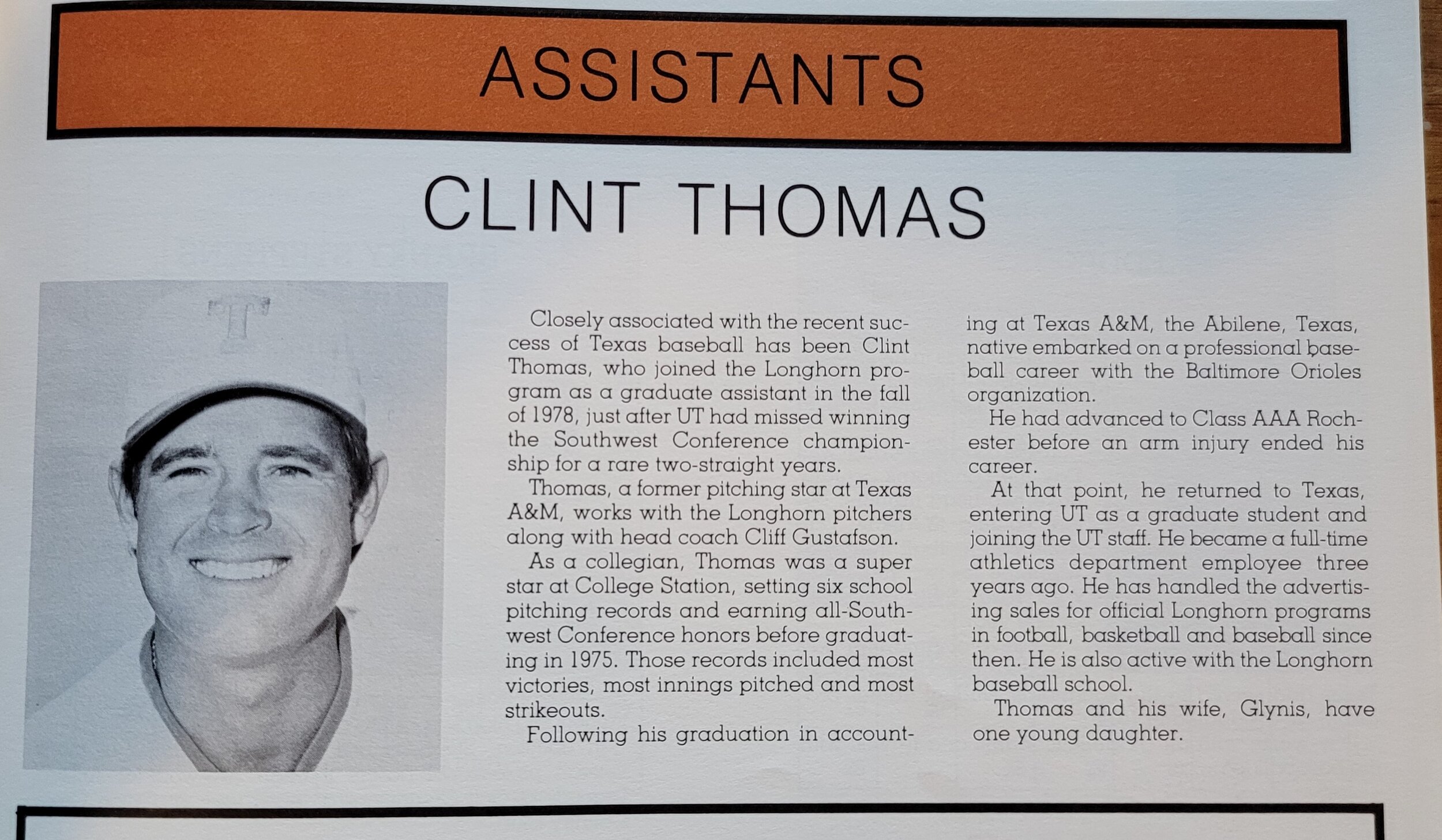
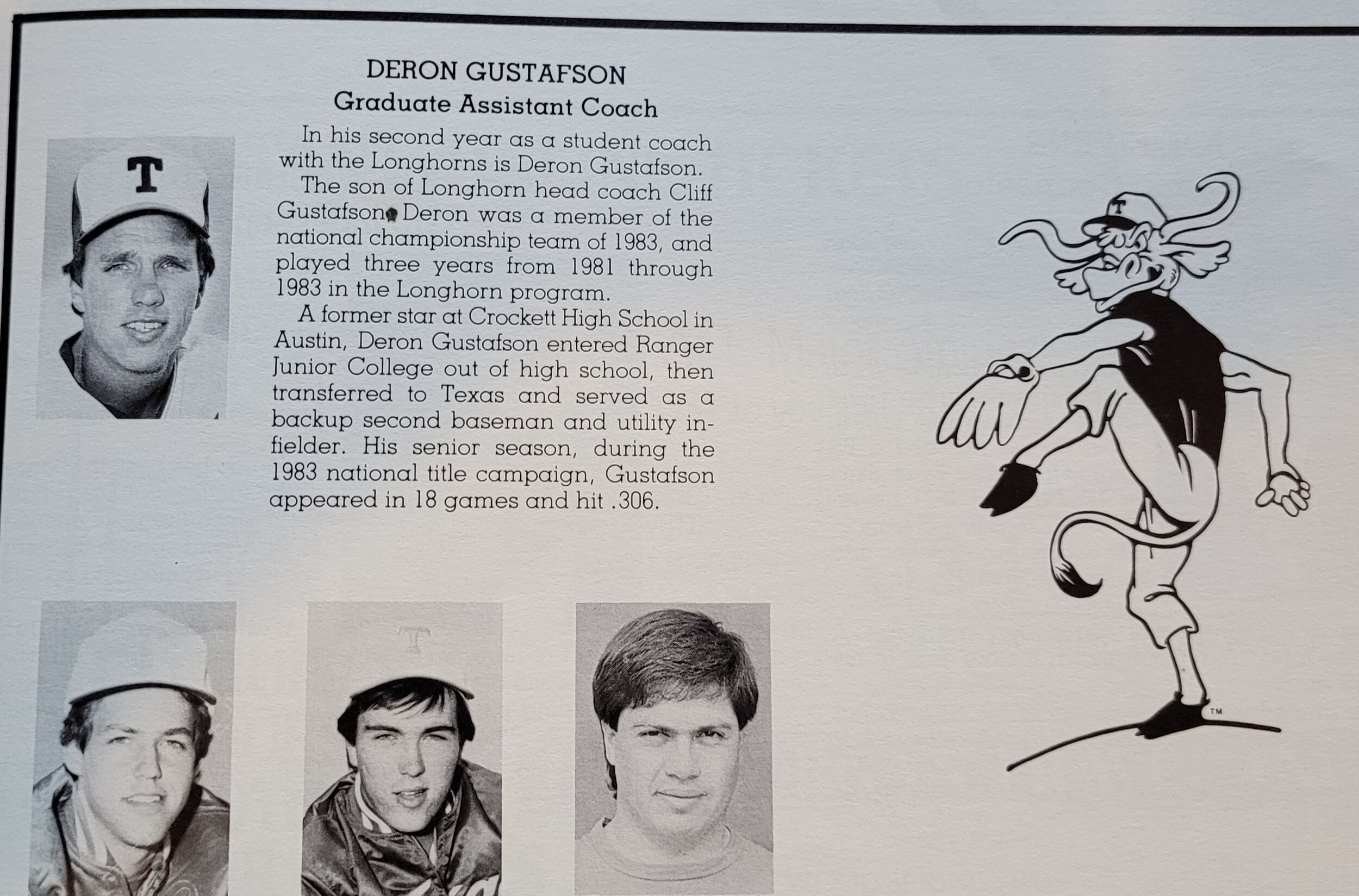
1985-1986- 51-14 College World Series appearance
This team hold the record for shutouts (11).
SWC champions but loses to Pepperdine in NCAA regional.
Greg Swindell (1984-1986)
Greg’s 14 career shutouts are an NCAA record. Swindell's 1.92 career ERA is nothing to scoff at either. Amassing 43 wins in his three years at Texas, the 1985 National Player of the Year certainly earned his College Baseball Hall of Fame honors.
Greg Swindell holds the Longhorn career record for most strikeouts (501) and the season records for most shutouts (6), most complete games (15), most strikeouts as a pitcher (204), most victories (19), and most innings pitched (172). He was freshman of the year in 1984 and the National Player of the Year in 1985 for Baseball America. Greg was a GOLDEN SPIKES AWARD FINALISTS IN 1984,1985, and 1986.
Curt Krippner is a first-team All-American.
Kevin Garner is an All American
1986-1987- 61-11- more info pending - Coach Gus
1987- NCAA decides to move to a single elimination Final Four format instead of 8 team double elimination. The NCAA officials also considered replacing Omaha where the CWS had existed since 1950 to moving the CWS around to big league parks.
1987 team earned 3rd place in the CWS. 61-11 - This was the 6th Longhorn team to win 60 games. Pitcher Curt Krippner and first baseman Brian Cisark earned All-American honors, and Coby Kerlin won the SWC batting title
Brian Cisarik sets the season Longhorn record for batting average (.429) and on-base percentage (.535).
Texas went 3-2 in Omaha, eliminated by eventual champion Stanford. More info pending.
1987- 1988 - 58-11-1
Coach Gus gets his 1,000 win. After winning the SWC tournament, Texas was seeded #1 in their region, but Texas lost to California and did not make the trip to Omaha.
1988- 1989- 54-18 The year of the injuries finished 2nd in the SWC but is runner-up for the national championship
1988-1989- baseball Horns finished second in the SWC. The pitching staff was injury riddle but the Horns hitting ability was winning games. Still, the Horns made the CWS tournament and came close to winning the national championship finally losing to Wichita State. Texas was undefeated in CWS tournament play, but a new ruling that allowed only one game to decide the National championship cost the Horns the title. Horns entered the CWS with a 51-17 record.
This Team Holds The Record For most doubles (177).
College World Series appearance
Scott Bryant holds the Longhorn season record for most total bases (199), most doubles (32), and most runs batted in (112). He won the Dick Howser Trophy in 1989. He is an All American and a GOLDEN SPIKES AWARD FINALISTS.
Pitcher Mark Smith is lost to Tendonitis for the year. David Klvac left the team. Jeff Seale injured his arm, and Mike Bradley was still recovering from shoulder surgery. Hitting made this year a success.
With all the injuries, It was a surprise that the Horns made it to the CWS, and more unbelievable is that they came within three runs of winning the NCAA championship against Wichita State. For the third time in the decade, Texas was on the cusp of a national title. Wichita State, led by future MLB manager Eric Wedge, finally broke through and won the title. The Shockers beat Texas 5-3 in the title game after Texas had reeled off three straight wins.
1989- 1990- 51-17 Augie Garrido
The team was inconsistent, but a 16-game winning streak helped them challenge for the SWC championship, but they lost. Texas reinvented itself after the serious injuries and soundly won the SWC tournament.
Pitching coach Clint Thomas did an excellent job of teaching the mechanics of pitching. Clint knew that good pitching always beat good hitting.
Horns won 22 of 25 games and ended the regular season with a record 45-15 as a #2 seed in the SWC tournament beating Houston to win the tournament. Cal State Fullerton stopped the Horns drive to the CWS at regionals.
1990 holds the record for stolen bases at 166.
Pitching was the strength this year, and the stats proved it. The ERA for the opposing teams dropped to 3.20 in 1990. Near the end of the season, the team had a 16 game winning streak. The team lost three key pitchers this year to injury- Kirk Dressendorfer, Roger Luce, and King. These injuries cost them the SWC, but the players won the SWC tournament.
1990- 1991- 48-19 SWC Champions
1991—The Aggies swept the Horns. It was the first time since 1972 that an SWC opponent had swept the Horns. Texas won the SWC championship on the last weekend of SWC play because Houston beat Texas A&M in 2 of 3 games.
Longhorn Abernathy is called “the fiddler” because he runs sideways like a fiddler crab. Texas won the SWC tournament crown but lost in the regionals to Oklahoma State.
Brooks Kieschnick is an All American who leads the team in batting (.358) and is freshman of the Year in 1991 and National player of the year in 1993 for Baseball America. He wins the Dick Howser Trophy in 1992 and 1993. He is a GOLDEN SPIKES AWARD FINALISTS in 1992, and 1993.
DH: Brooks Kieschnick (1991-1993)
Kieschnick is undoubtedly the most versatile Longhorn baseball player of all-time. Kieschnick was nearly just as strong at pitcher, competing at both the college and professional level. He's at DH in the lineup, but this utility player could've taken nearly any position in the Longhorn best list.
One of the eight Texas players in the College Baseball Hall of Fame, Kieschnick won National Player of the Year honors in 1993, leading the Longhorns to a College World Series appearance. His number 23 jersey is retired by Texas, and it’s easy to see why -- he was Texas’ best hitter and pitcher in every season he played with the Longhorns. In 1993, Kieschnick hit .374, and also honed a 3.24 ERA. He is tied for third all-time for Texas single-season home runs with 19 in 1993, and is sixth all-time for Texas single-season wins, with 16 in the same year. His career .676 slugging percentage is second in Texas baseball history, and he’s third in Texas career RBI’s, home runs, and total bases.
1991- 1992- 48-17 pending information
Many Longhorns believed that superstition was just important to winning as talent. Lucky Charms , pre-game meals, favorite socks or shoes, and talking to your glove or bat were some of the more popular “winning” superstitions. Number 1 superstition for converting a losing game to a win was putting on their “rally” cap.
1992 – Pitching‘s always the biggest thing”, Gustafson said as he prepared for practice. However, he is not destitute, having pitchers Brooks Kieschnick and Scott Harrison, and Jay Vaught. Still, Pitching was not dominant this year, with a ERA of 3.80. Injuries hurt the pitching staff.
This was Gus fasted outfield as Texas Coach.
College World Series appearance. For Coach Gus's 25th birthday with the Horns, he receives another invitation to the CWS.
Calvin Murray and Brooks Kieschnick led the team with Scott Harrison the SWC top hurler in 1992.
Calvin Murray sets the Longhorn career record of stolen bases - 139 and leads the team in batting (.351)· First-Team All-American in 1992
NCAA Regional's Outstanding Player
Finished Texas career with a .311 batting average, 197 runs scored with 14 triples, eight home runs, and 139 stolen bases
Southwest Conference's all-time leader in stolen bases
Selected a member of the USA Baseball National Team and represented the U.S. in the 1992 Barcelona Olympic Games.
Calvin Murray is arguably the best leadoff hitter ever for the Horns.
Texas went 2-2 before being eliminated by eventual champion Pepperdine, 5-4 in the College World Series.
Shea Morenz signs with Texas instead of taking the money and playing for the Toronto Blue Jays. He is the most heavily recruited player in the state. As a Senior in high school, he batted .507. His first at-bat with the Horns, he hit a home run against Cal-State Fullerton. Shea was mature beyond his years. He was under tremendous pressure at Texas to perform in baseball and football. Teammates, coaches, classmates, and parents were all trying to run his life. Instead, he chose to listen to his heart instead of any of them. Shea understood that "once you start letting ….people run your life, you're just a dummy out there in the field, going through the motions. I'm here to enjoy myself and to enjoy the athletics I'm taking part in. I don't want that jeopardized by people's expectation of me."
1992-1993- 51-16 pending information
Kieschnick is SWC's most valuable player. Hickman is All SWC. Gustafson becomes the winningest active Division I coach. This was a year of ups and downs for the team, but the results did not change. Texas makes it to the CWS.
Texas went 1-2 in the CWS tournament, losing to Oklahoma State 7-6.
This was the last CWS appearance by Cliff Gustafson. He finished with 17 trips to Omaha, the most ever by a coach. The second most appearances belong to Rod Dedeaux of USC, who went to 15 (Dedeaux was co-head coach of USC during the program’s 1948 and 1949 appearances).
Texas’ longest drought between appearances would follow — seven years and six seasons — before they would return to Omaha.
1993 team registers the most strikeouts.
1994- 43-21 Gus Ball SWC champs- A Passion for the game
Gus never recruited in anyone’s living room but his own.
Gus did not like traveling, so out of 1,650 plus games as Texas Coach, he only played 366 on the road.
1994- Peanut butter, 50 ways to win a game. Taking pitches, balks, double steals, and 5 run innings with one hit are Gus trademarks.
This was not a great year for Gus to make baseball history with 1,333 victories on a team that was 32-16 for the season.
NCAA rule limiting teams to 20 hours of workouts a week and reducing Fall practice from 8 weeks to 4 forced Gus to change his philosophy from outworking the opponent to outcoaching them. Boo Birds were all over Gus this year for losing so many games. This season was full of juggling the pitcher rotation and replacing all three outfielders because of injuries.
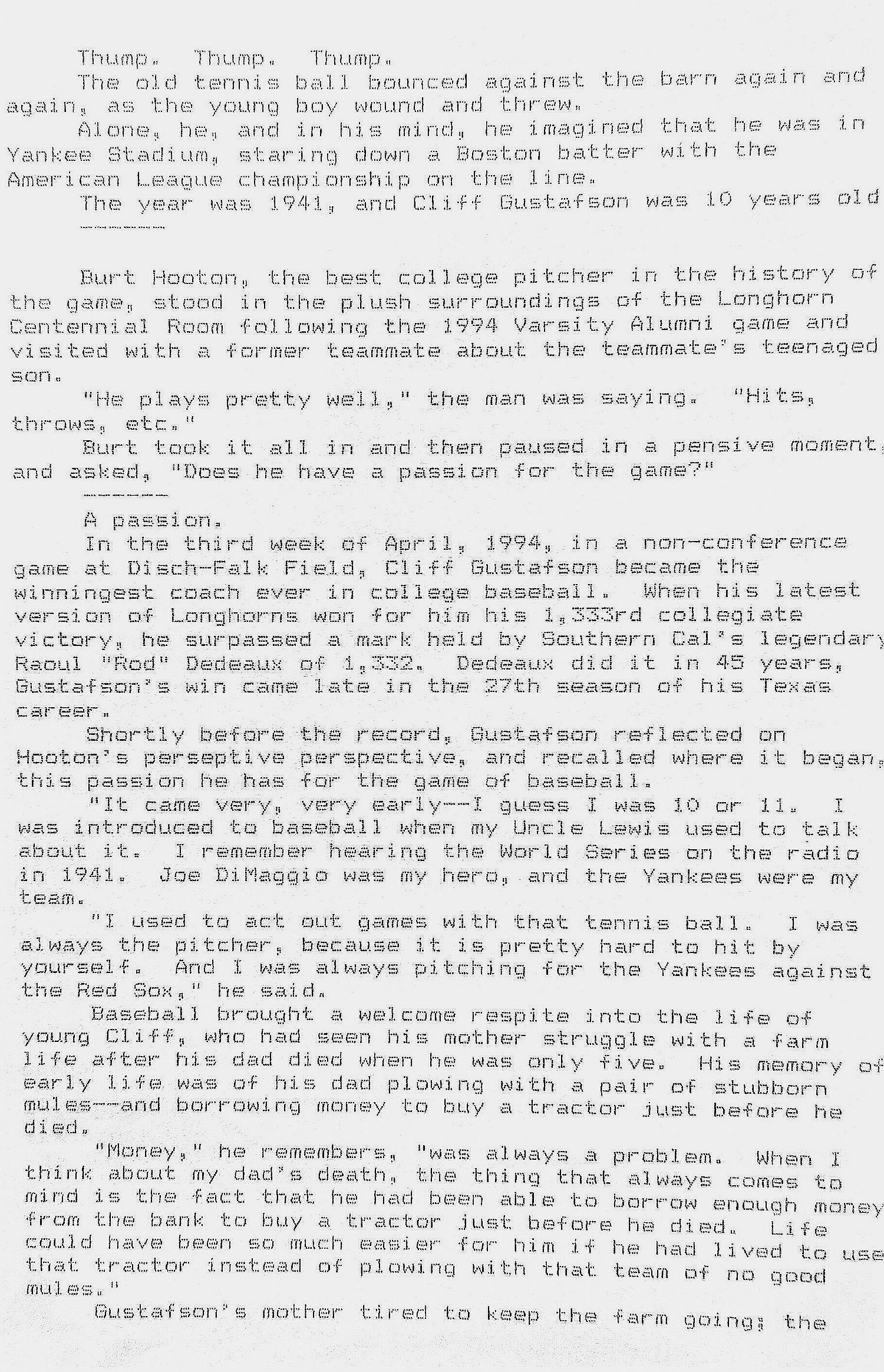
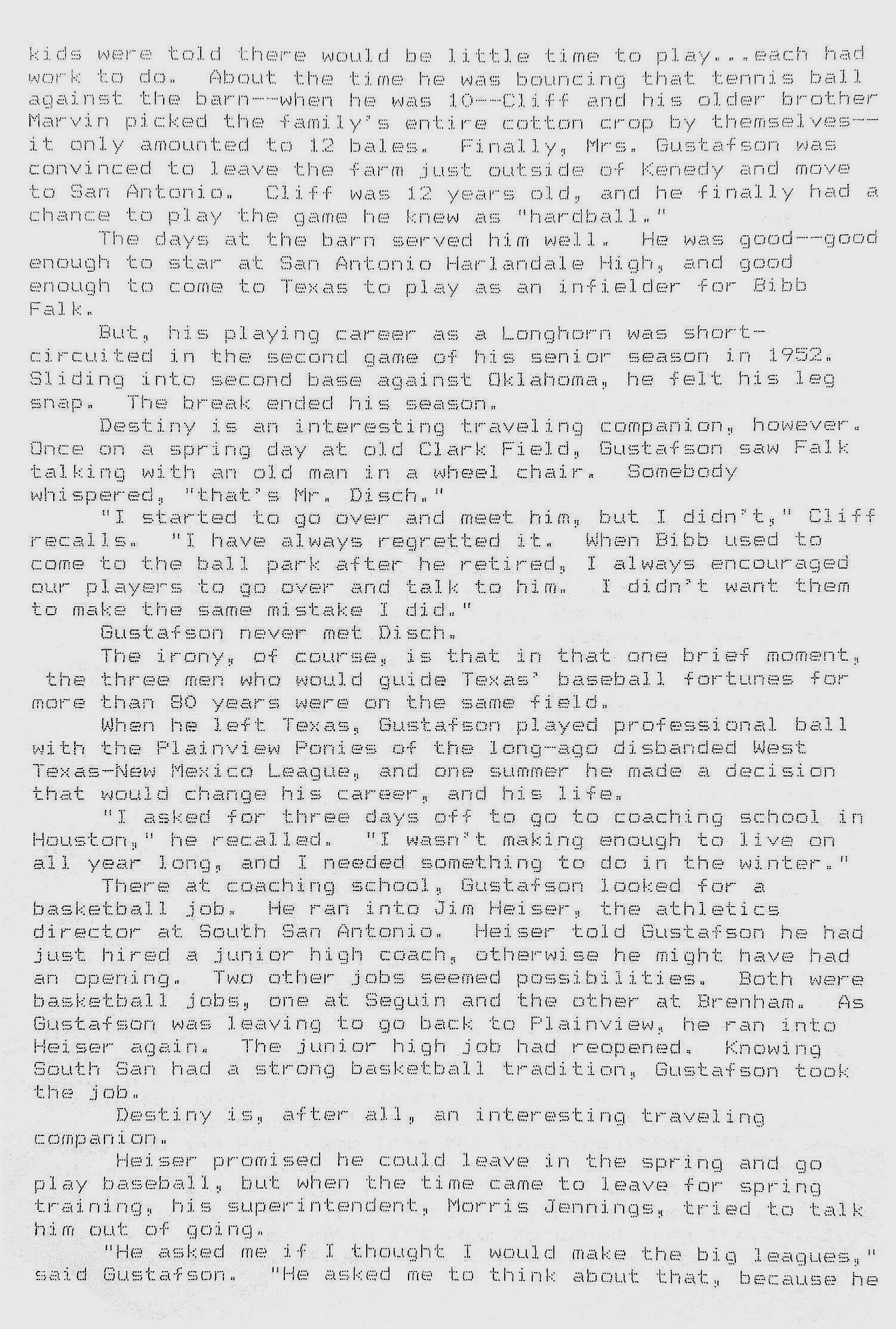
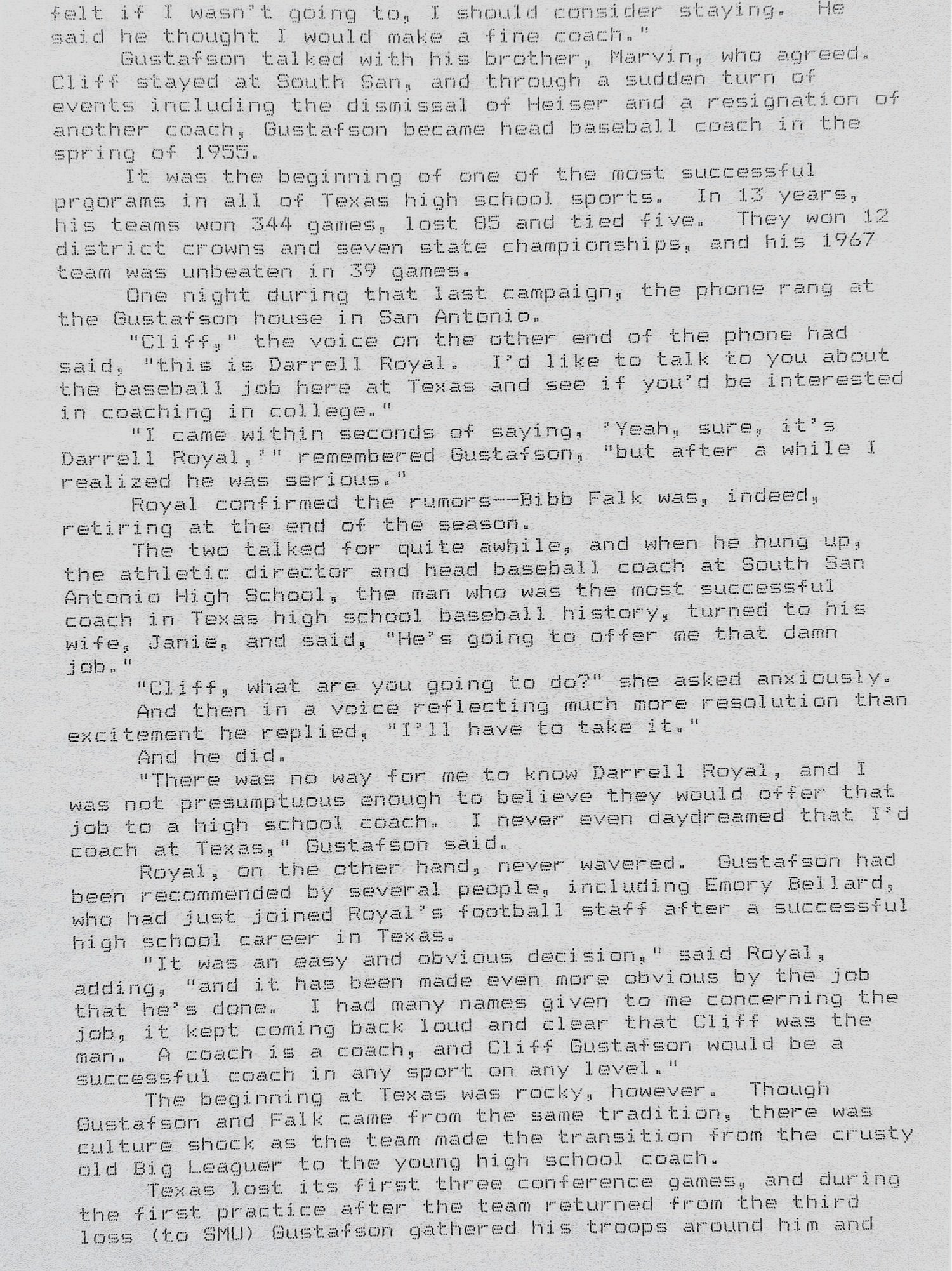
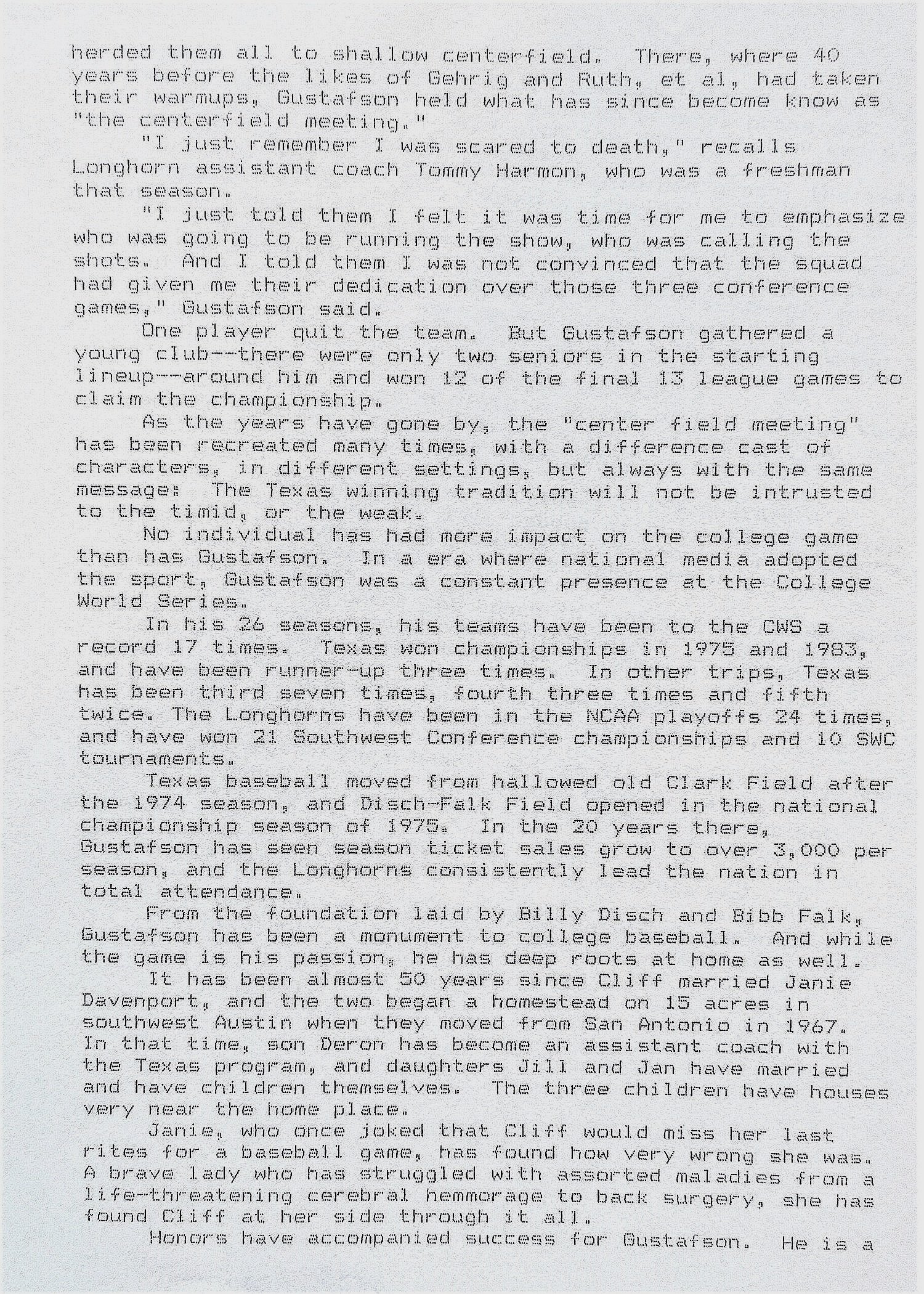
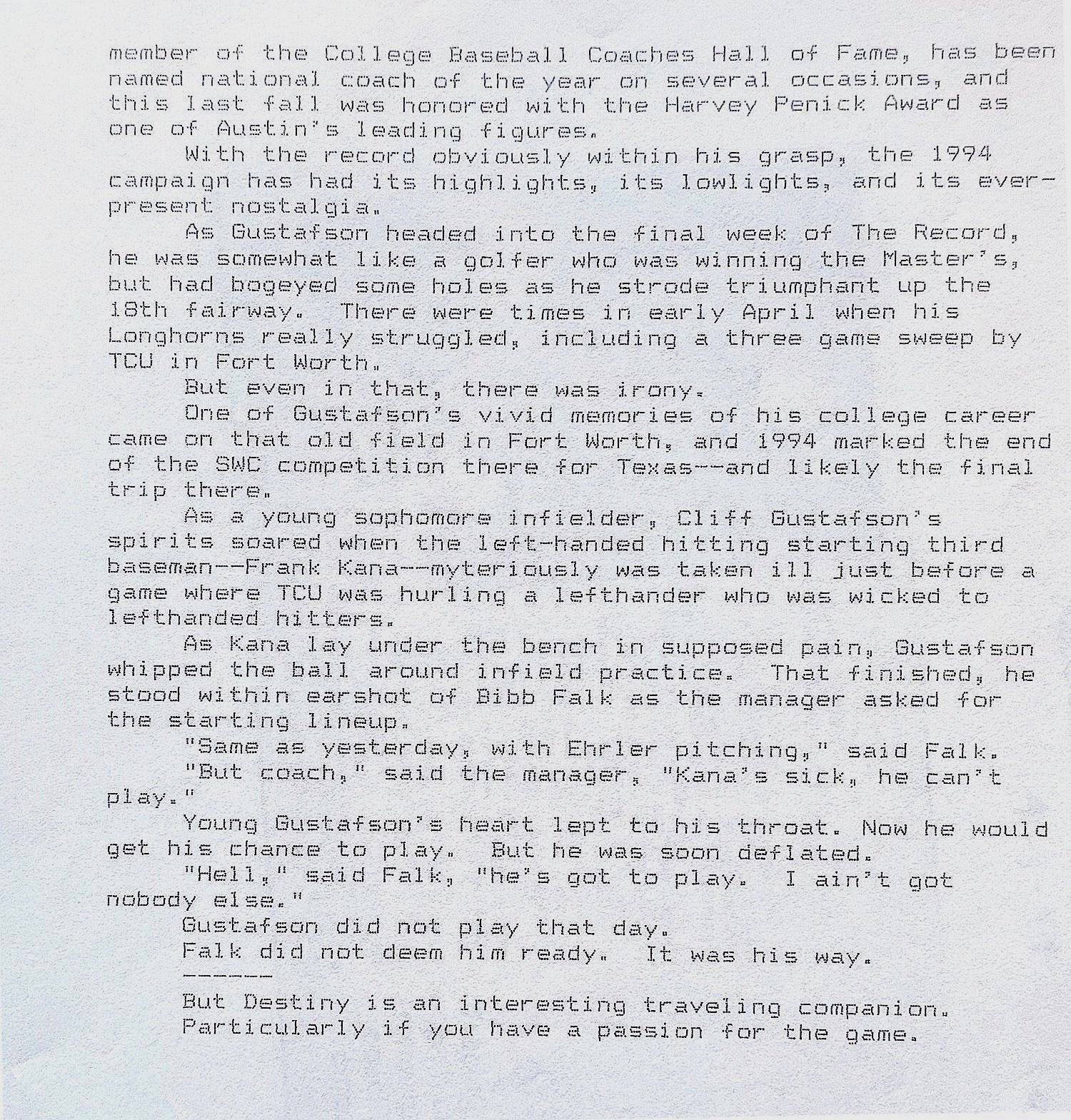
A record setting Career for Coach Gus
1995- 44-19 pending information
This team holds the record for most wins with 10 or more runs (12) and has two pitchers post 10 wins.
Horns win their first 15 games on the strength of Chris Edelstein, Kip Harkrider, and Wylie Campbell. Cal State hands Coach Gus his worse loss (3-17). Coach concedes that his pitching staff is not stable, and his relievers were not throwing quality pitches.
1996- 39-24
Horns win the final SWC Crown. After 21 games in 1996, the Horns were 10-11 but the team recovered to win the final SWC championship and end the season with a 39-24 record – Ranked 16th in the country.
Coaching legends build the character of the team first. That character is then passed onto the players to shape their lives.
1996 team holds the record for steals in a year (43).
1996 8 players made the All Big 12 team
Coach Gus in Reflection
Darrell Royal, the athletic director in 1968, gets credit for hiring Cliff. Darrell Royal offered Gus the job over the phone. When Royal asked how much he was making at South San, Gustafson was embarrassed to tell him that he was making a lofty sum of $11,500. So Gus said to Royal, “I am making $10,500.” Royal offered him the same amount to come to Texas.
Years later, Royal was asked if he ever dreamed Gustafson would be so successful. He responded, "Hell, no, If I'd known that, I'd have gone down there in my car to hire him instead of calling him on the phone."
Gus's record includes:
22 Conference titles
11 SWC Tournament Championships
2 National Championship -( 1975 and 1983)
NCAA record 17 appearances to the College World Series
Won lost record of 1466-377-2 record
Member of the American Baseball Coaches Association Hall of Fame
1994 inductee into the Texas Sports Hall of Fame
1998 received the James Keller Sportsmanship Award
Coach makes decisions during his coaching years by statistics and percentages.
Gus won because he had an eye for talent, a recruiting moral compass,work-outs that preached repetition as the mother of all baseball skills, and a style of play called GusBall - gambling, run-a-bunch style in which nobody worries about hits. His teams won by using discipline and patience at the plate. No team on any level took more pitches than Texas. Many times the Horns had more runs than hits. In 1981 against Baylor, the Horns scored seven runs on one hit in the last inning to win 13-6.
Recruits loved Gus's down-home and upfront interaction, but he was not happy when a recruit recanted a promise, so Gus held his moral ground. A high school catcher from California, Jeff Hearron, promised to come to Texas, so Gus moved on to recruiting other athletes in other positions. Gus and Jeff were talking on the phone when Jeff said he might go to Arizona State. Hearron told Gus he was going to "pray over his decision." Gus responded, "So am I, only I'm going to pray that the Lord will forgive you for being a liar." Hearron joined the Longhorns
Gus hated traveling and changing so much he would massage the baseball schedule to get as many home games as possible. One year The Horns played 38 of 48 regular-season games at home. Sometimes changes were even worse than travel. Someone threw away his coffee cup after the handle broke. He was furious at losing a cup that had served him well for 19 years. Super glue could have fixed his prize possession.
As of 1994- 35 of his players made it to the majors, including Boston's Roger Clemens and Houston's Greg Swindell, but he says, "I'm just as proud of coaching three orthopedic surgeons."
Gustafson doesn't just coach; he teaches. Longhorn Shortstop Spike Owen was asked if Gustafson had ever done anything to help his game. "Naw, not really," says Owen. "All I can think of is that I used to take two or three little crow hops before I'd throw. He got that out of me in a week. My footwork deep in the hole was terrible, and he fixed that. He changed my throwing from over the top to three-quarters. He changed my grip on the bat entirely. Then he changed my stance. So he hasn't changed me much."
Pitcher Calvin Schiraldi says, "All Coach Gus is, is a genius." Dodger Pitcher Burt Hooton says, "I've always wanted to be just like Gus, but so far, the only similarity is we're both bald." Howard Richards, a member of the Texas Board of Regents, says, "I wish we could clone Cliff and let him coach every sport." Athletic Director DeLoss Dodds, before they parted ways, said, "If you took the best parts of all coaches, you'd get a Gus."
The overriding point is that Gustafson loved baseball. As a master chess player, baseball nurtured his competitive spirit, and he was able to master most other teams as the head coach of the Longhorns. But like DKR in football at the end of his career, he said, "the only bad thing is that the agony of defeat sure lasts a lot longer than the ecstasy of victory. It shouldn't be that way." Royal resigned, citing this as one of the reasons he left coaching. Cliff Gustafson left for many more complicated reasons.



